- Vote: Reader’s Choice
- Meta Quest 4
- Google Pixel 9
- Google Pixel 8a
- Apple Vision Pro 2
- Nintendo Switch 2
- Samsung Galaxy Ring
- Yellowstone Season 6
- Recall an Email in Outlook
- Stranger Things Season 5

The best web browsers for 2024
All web browsers have the same basic function, and yet, the choice between them has always been one of the most contentious in tech history. You have more options these days than ever before, whether you’re looking for the best web browser for privacy , the best for speed, or perhaps something a bit more adventurous.
To help you decide on the best web browser, we grabbed the latest browsers and put them through their paces. Even if some could use a complete overhaul, these options are your best chance for a great online experience.
The best web browser: Google Chrome
Chrome is ubiquitous — and for good reason. With a robust feature set, full Google Account integration, a thriving extension ecosystem (available through the Chrome Web Store), and a reliable suite of mobile apps, it’s easy to see why Chrome is the most popular and the best web browser.
Chrome boasts some of the most extensive mobile integration available. Served up on every major platform, keeping data in sync is easy, making browsing between multiple devices a breeze. Sign in to your Google account on one device, and all Chrome bookmarks, saved data, and preferences come right along. Even active extensions stay synchronized across devices.
Chrome’s Password Manager can automatically generate and recommend strong passwords when a user creates a new account on a webpage. Managing saved passwords and adding notes to passwords is even easier. The search bar, or Omnibox, provides “rich results” comprised of useful answers, and it now supports generative AI capabilities. Favorites are more accessible as well, and they’re manageable on the New Tab page. And it’s now easier to mute tabs to avoid unwanted sounds.
Other updates have included a Dark Mode for Windows and macOS , better New Tab customization and tab group creation, tab hover cards, and an in-browser warning if your password was discovered in a data breach. There’s a price tracking feature that can help locate the best deals. Android users will appreciate the Phone Hub for linking and monitoring their phones. There’s also the ability to quiet notifications, so websites don’t bombard you with requests to enable in-browser notifications.
What’s the bottom line? The Google Chrome browser is fast, free, and even better looking than before. With a thriving extension ecosystem, it’s as fully featured or as pared-down as you want it to be. Everything is right where it belongs, privacy and security controls are laid out in plain English, and the browser just gets out of your way. While it can be a little RAM-hungry at times , Google is working to make it more efficient — like Microsoft’s Edge, Google can now hibernate tabs in the background to stop them from using too many resources.
Overall, Chrome remains the best web browser download for the average user.
And, things are looking to get even better. Google announced some significant upgrades to the browser that haven’t gone live yet, to celebrate Chrome’s 15th birthday . A Material You design language will allow users to customize Chrome’s look and feel and attach themes to profiles to make it easy to tell them apart. The menu system will be revamped to provide easier access to a variety of settings and features including Extensions, Password Manager, Translate, and others. The Chrome Web Store will be redesigned using Material You to be easier to use, and AI will help identify useful extensions. And finally, Safe Browsing will now work in real time to protect against threats.
The best Chrome alternative: Microsoft Edge
In response to the market’s rejection of its original home-grown Edge browser, Microsoft rewrote Edge using the open-source Chromium web browser engine. The new Edge launched on February 5, 2020 , as a separate, stand-alone browser that replaced the integrated version. It became part of Windows 10 with the May 2020 update, although you can still download it for Windows 10 builds prior to version 2004. Of course, it’s the default web browser for Windows 11.
At first glance, the new Edge browser looks and feels like Google Chrome. It prompts you to import Chrome’s bookmarks toolbar and other settings. This is great if you hated the old Edge browser and want to give Microsoft’s new browser another shot. It also supports Chrome extensions , though the browser leads you to the Microsoft Store for add-ons. You must manually load the Chrome Web Store to install anything not listed in Microsoft’s repository.
However, it’s not Chrome with a Windows 11 theme. Microsoft reportedly disabled many features, including Google’s Safe Browsing API, ad blocking, speech input, Google-centric services, and more. In return, the company worked to optimize Edge and reduce its footprint while continuing to add new, Microsoft-oriented features. As of January 2023, Edge is the most efficient browser in terms of memory usage. It also allows sleeping tabs, to let tabs release their resources when they haven’t been used for some time.
Features launched since its release have included the new Edge Sidebar that provides easy access to various tools, more flexibility in managing how Edge starts up, Citations to make it easier for students to cite sources, and various other updates to make the browser more productive. Edge Workspaces lets users organize tasks into dedicated windows, and Microsoft has continuously tweaked various features, like the Edge Sidebar, to make them more user-friendly.
Microsoft Edge also provides simpler privacy settings and security updates. Microsoft Edge uses a graphically friendly interface that displays three security levels: Basic, Balanced, and Strict. With Balanced set as the default, many sites request you to disable your pop-up blocker even though one isn’t manually installed. All in all, we’re very optimistic that Edge is on its way to challenging Chrome as the best web browser.
The best Chromium alternative: Mozilla Firefox
Firefox is the best browser that’s not based on the Chromium browser engine. Mozilla has taken real strides to make its browser a truly modern way to surf from site to site, thanks to efforts like its upgrade to Firefox Quantum , its VR alternative Firefox Reality , and password-free browsing .
It wasn’t too long ago that Mozilla rebuilt the browser’s interface, offering a cleaner, more modern take on what a web browser should be. The changes weren’t just skin-deep, however. There’s some impressive engineering going on behind the scenes.
For example, Firefox Quantum is designed to leverage multicore processors in ways that its competitors just aren’t doing. It was not designed to make a huge difference in your day-to-day browsing, but Mozilla hopes this design will give Firefox Quantum an edge moving forward. By engineering for the future now, Firefox Quantum is in a better position to take advantage of quicker processors as they emerge.
Some Firefox strengths include privacy protections with SmartBlock anti-tracker support, improved password syncing across devices, enhanced readability, integrated breach alerts, and a Protections Dashboard that provides a summary of how Firefox protects your privacy behind the scenes. WebRender improves the graphics performance on Windows PCs with Intel and AMD CPUs.
Recent updates include easier download management, captions, and subtitle support on YouTube, Prime Video, and Netflix videos watched in picture-in-picture mode, HDR support in macOS, and the ability to edit PDFs with text, drawings, and signatures. Firefox can also recognize text from an image, which is copied to the clipboard when selected. Finally, Firefox Colorways provides new options for optimizing how Firefox looks on-screen.
Beneath those changes, Firefox remains a comfortable, familiar standby. It’s a capable browser with a deep catalog of extensions and user interface customization. While managing settings across platforms isn’t as seamless as Google Chrome , the mobile browser app lets you share bookmarks between devices when using a free Firefox account.
There’s a bit of a fringe benefit, too. Since it’s been around longer than Chrome, some older web apps — the likes of which you might encounter at your university or workplace — work better on Firefox than they do on Chrome. For that reason, it never hurts to keep it around.
Overall, Firefox is more privacy-centric than Chrome and comparably fast, but its feature set isn’t quite as expansive elsewhere. If you like the sound of this, download the Firefox browser today.
The most innovative web browser: Opera
Another venerable browser and popular alternative, the Opera browser shares much of Chrome’s DNA and deserves its place as one of the best web browsers. Like both Edge and Chrome, Opera is built on Google’s open-source Chromium engine and, as a result, they all have a very similar user experience. Both feature a hybrid URL/search bar, and both are relatively light and fast.
The differences appear when you look at Opera’s built-in features. Where Chrome relies on an extension ecosystem to provide functionality users might want, Opera has a few more features baked right into the browser itself. It introduced a predictive website preload ability, and an Instant Search feature isolates search results in their separate window while the current page fades into the background, letting users more easily focus on the research task at hand.
You can install extensions from the Opera Add-ons store , which are just like Chrome extensions. Similar to Google’s browser, you’ll find useful tools like Giphy, Amazon Assistant, Avast Online Security, Facebook Messenger, WhatsApp, and more. If Chrome’s wide variety of extensions is important to you, then Opera becomes an intriguing alternative. It might just be one of the best browsers for quickly navigating web pages.
Opera also features a built-in “Stash” for saving pages to read later. There’s no need to sign up for a Pocket or Evernote account to save a page for later reading. Similarly, Opera features a speed-dial menu that puts all your most frequently visited pages in one place. Google Chrome also does this, but only on a blank new tab. Finally, Opera has a built-in unlimited VPN service, making it a more secure browser option.
The biggest changes came with Opera 60 and Reborn 3, a complete revamp that brought a new borderless design, Web 3 support, and a Crypto Wallet, allowing users to prepare for blockchain-based sites. With version 69, Opera became the first browser with a built-in Twitter tool, and the company has added others as well including Instagram and TikTok. Just click the icon on the toolbar, log in to your account, and tweet away right from within the slide-out menu.
Other recent advancements include Lucid Mode, which sharpens video playing on a variety of platforms, supports emojis instead of web links, and other enhancements. The Opera Sidebar adds new functionality much like Edge’s Sidebar, allowing quick access to various Opera features. And Opera Aria adds new generative AI capabilities built right into the browser.
You can see that we’re well into hair-splitting territory, which is why it’s important to remember that your choice of browser is, more than any other service or app you use each day, entirely dependent on your personal preferences — what feels most right for you. The Opera web browser has a unique look and feel, and it combines some of the best features of Mozilla Firefox and Google Chrome.
Alternative browsers
While the preceding browsers will meet most users’ needs, other alternatives exist for anyone looking for something different. This section is for those who have a more niche preference in web browsers or want to try something new.
Apple Safari
If you use Apple devices exclusively, Safari is already your default browser. It’s also significantly faster than in the past, surpassing Chrome in its quickness. It’s integrated into iOS, iPadOS, and macOS, and you’ll likely get better battery life thanks to Apple’s in-house optimizations and the underlying hardware.
Safari also focuses a great deal on privacy and security. If you want to minimize how you’re tracked and whether Big Brother is looking over your shoulder, then Safari is a good choice. If you also use an iPhone and/or an iPad, then using Safari on your Mac will make for the most seamless transition between platforms. Open websites on an iPad or iPhone are carried over to macOS.
Safari is not offered outside the Apple ecosystem.
Vivaldi Browser
The Vivaldi browser is truly unique. No two Vivaldi users will have the same setup. When you run it for the first time, you’re guided through a setup process that lays out your browser in a way that makes sense for you. You choose where your tabs and address bar go and whether you want browser tabs displayed at the top of the page or in a separate side panel. This is a browser built from the ground up to deliver a unique user experience, and for the most part, it succeeds. Vivaldi 2.0 enhanced the customization features and made them easier to access.
This browser excels at customization, and you can choose from a variety of tasteful themes that don’t feel dated or out of place on a modern PC, in addition to the aforementioned UI choices. It also has some standout privacy-enhancing features, like its team-up with DuckDuckGo to make the non-tracking search tool the default option when in privacy mode.
Finally, recent updates added more powerful tab management, enhancements like Web Panels that make for smarter browsing, and (as mentioned) even more powerful customization options. Other new updates include a built-in ad blocker, a built-in tracker blocker, a clock in the Status Bar, a new Notes Manager, and a Break Mode for pausing the internet while keeping the browser open.
Brave Browser
One of the most unusual browsers around is Brave — or, perhaps, it’s Brave’s business model that’s the strangest. Brave blocks all ads on all web pages by default, which makes it arguably the fastest browser around. Ads are a huge portion of how many websites make money — block these ads, and suddenly the most important web financial tool is eliminated.
That’s where the Brave Rewards program comes in. Users receive Basic Attention Tokens (BATs) when they view alternative ads that Brave places in the browsing stream. Users can pass along a portion of their tokens to publishers. As of January 2021, there were over 70,000 websites that supported BAT-based transactions through the Brave browser, including Wikipedia, The Guardian, WikiHow, MacRumors, and more.
What’s in it for users? Simply put, if you’re not waiting for ads to download along with website content, then your web experience will feel much faster. Brave performs no user tracking, making it ideal for private browsing as well.
Tor Browser
The Tor Browser is a version of Firefox that serves one very specific purpose: A simple entry point for The Onion Router, or Tor .
Tor is software combined with an open network aimed at making you invisible by routing your traffic through several anonymous servers. While it’s not foolproof, it’s very difficult for someone to identify you when you’re properly configured and using something like the Tor Browser to surf the web — especially if combined with a VPN .
There are many legitimate uses of the Tor Browser and the Tor network. It’s a good choice for people who live in countries with repressive governments, as well as journalists and activists. The dark web is also one of the destinations for people using Tor, which includes many nefarious and illegal sites.
In any event, if you want to remain completely anonymous while surfing the web, the Tor Browser and network are for you. If you want a more mainstream alternative, Opera includes a VPN component, but it’s far less private.
Avast Secure Browser
Avast Secure Browser first arrived as the Opera-based Avast Safezone Browser in 2016 as part of the Avast Antivirus paid bundle. It was revised and rebranded in 2018 as a free stand-alone product based on Chromium. Originally the “SafeZone” aspect kicked in when users visited websites to make purchases or manage money.
Avast Secure Browser provides several built-in tools to protect your data and privacy. These include an anti-phishing module, fingerprinting and online tracking prevention, an ad blocker, and a Webcam Guard tool to control which websites can access your camera. The Hack Check tool will determine if your info was leaked in a data breach.
Avast Secure Browser is a stand-alone download for Windows, macOS, Android, and iOS. The desktop version doesn’t include an integrated VPN but instead directs users to download the company’s separate SecureLine VPN software. The listed Bank Mode — part of the Avast Free Antivirus client — flips on when users load a banking website.
Best web browser features — what to look for
Benchmark tests.
Notice we don’t include Safari in our main comparison. Apple’s Safari web browser is unavailable on Windows, Android, or Chrome OS, so we removed it from our primary list.
Most browsers are compatible with web standards and handle performance with relative ease. A casual user probably won’t notice a difference in the rendering speed between today’s modern browsers, as all six are much faster and leaner than those of a few years ago.
We ran the following benchmarks on a desktop with an AMD Ryzen 7 5800X processor, 32GB of RAM, a 1TB M.2 PCIe NVMe solid-state drive, and Windows 11. All browsers were clean installs of the most current production versions as of January 2023, and all were run at their default settings.
First, JetStream 2 is a JavaScript and WebAssembly benchmark. It tests how quickly a web browser can start and execute code, and how smoothly it runs. Higher numbers are better.
Notice how all three Chromium-based browsers outperform Firefox. In fact, there’s very little difference between them, while Firefox’s performance is quite poor by comparison.
The next test we ran was Speedometer 2.0 . It measures how responsive a browser is to web applications by repeatedly adding a large number of items to a to-do list. Higher numbers are better.
Here, Opera led the pack, with Chrome and Edge running nearly neck to neck. Firefox came in last here with a relatively low score.
Finally, we tested how much RAM each browser uses, both with no tabs open and then with 10 tabs open accessing the same popular sites. We made sure that each browser had no extensions running, and we let each browser settle in before looking at its memory use. For the test with 10 tabs open, we averaged memory use when all the tabs were opened and then five minutes later to account for any variability.
It’s not a scientific test, but it should be sound enough to give you an idea of which browsers are the most and least efficient in terms of taking up your RAM. We found Opera to use the least amount of RAM when first opened, barely ahead of Edge, while Chrome used the most. Edge used the least with all 10 tabs loaded by a significant margin, a third or less than the other browsers. Chrome used the most with all 10 tabs open, and Firefox and Opera weren’t far behind.
Security and privacy
The most valuable tool for secure and private browsing is user discretion, especially when you consider that every web browser has encountered security breaches in the past. In particular, Internet Explorer and Chrome’s reputations for protecting users’ security and privacy credentials are spotty at best.
Chrome, Safari, Vivaldi, Opera, and Firefox all rely on Google’s Safe Browsing API to detect potentially dangerous sites. Thanks to constant updates, Mozilla, Chrome, and Opera all make constant security improvements. Microsoft disabled this API in Edge.
All browsers offer a private session option, too. Private sessions prevent the storage of browsing history, temporary internet files, and cookies. Browser support for Do Not Track remains spotty.
Mozilla made some strides in differentiating itself from others with a real focus on privacy in recent years. It even debuted a Facebook Container in 2018 to make it harder for the social network to harvest user information.
Frequently asked questions
Do you need to use a VPN when browsing the web?
You do not have to use a VPN when browsing the internet. However, a VPN can be a good tool to use as it protects your privacy and data by creating a secure and encrypted data tunnel between your browser and a VPN server. In turn, that server creates a secure and encrypted connection between it and the target website.
As a result, the website can’t identify you personally, nor can it see your true geological location or internet address. Not even your ISP knows where you’re surfing or the device you use with a VPN enabled. Some VPN services are free while others require a subscription. We have a list of the current best VPN services .
Which browser is most used in the world?
Google Chrome leads the web browser market with a 64.68% share, according to Statcounter . Apple Safari follows with 18.29%, Edge at 4.23%, Mozilla Firefox at 3.01%%, and Opera at 2.25%. Internet Explorer is still in use with 0.81%, while Microsoft Edge “Legacy” is fading out at 0.32%.
What are the best ad blockers to use for your browser?
We have a guide on the best ad blockers for Google Chrome , but here’s a short list:
- AdBlock and AdBlock Plus
- AdGuard (Chrome only)
- CyberSec by NordVPN
- Poper Blocker (Chrome only)
- Stands Fair AdBlocker (Chrome only)
- uBlock Origin (Chrome and Firefox only)
What is browser fingerprinting and how can you prevent it?
Websites want to know everything about you: Your tastes, your habits, and where you like to surf. When you load a website, it quietly runs scripts in the background that collect information about you and your device. The operating system, the web browser, all installed extensions, your time zone — all of this information is strung together to create a “fingerprint,” which in turn can be used to trace you across the internet via cross-site tracking.
Avast provides a detailed explanation and outlines various forms of fingerprinting. For example, the “canvas” method forces the browser to draw an image or text in the background, without the user knowing, to determine the operating system, web browser, graphics card, installed drivers, and the current font style. Device fingerprinting determines all internal and external device components.
As your fingerprint is tracked across the internet, this “profile” can be sold to data brokers, who then resell the data to advertisers. It’s a more silent means of gathering information about you versus using cookies that require your consent. The problem is, browser fingerprinting is still perfectly legal.
The best way to prevent browser fingerprinting is by randomizing and generalizing data. Third-party software like Avast AntiTrack does this by inserting “fake” data when website scripts try to collect your information. However, this tool allows scripts to continue running in the background so the website doesn’t “break.”
Many browsers offer some type of anti-fingerprinting protection. These include Avast Secure Browser (see above), Brave Browser (randomization), Mozilla Firefox (blocks fingerprinting scripts), and Tor Browser (generalization).
Editors’ Recommendations
- 9 best 2-in-1 laptops in 2024: tested and reviewed
- The 5 best laptops for browsing the web in 2024
- The best PDF editors for 2024
- Best Products
- Google Chrome

Mark has been a geek since MS-DOS gave way to Windows and the PalmPilot was a thing. He’s translated his love for technology into a marketing, consulting, and freelance writing career aimed at helping people use technology to enhance their lives. At Digital Trends, he reviews laptops and desktops, including the latest from HP, Dell, Lenovo, Apple, and more, and writes news and easy to understand how-to articles about the computing industry as a whole.
When he’s not writing, you’ll find him reading and watching science fiction, taking photos with his family, and obsessing over Indiana University basketball.
Laptop Reviews
Best Budget Laptops Best 2-in-1 Laptops Best Business Laptops Best Laptops Under $1,000
If you’ve got one of the best MacBooks or Macs, the chances are good that you do an awful lot of sensitive stuff on your computer. Think about all the passwords you enter, the emails you send and receive, and the documents you create -- all of those can provide a treasure trove of data to any sticky-fingered ne’er-do-wells who manage to gain access to your device.
To prevent the worst from happening, it’s a good idea to beef up your Mac security. The good news is that doing so is far easier than you might think, and there are a handful of macOS settings you can change right now to keep your Mac -- and all the information it holds about you -- safe from prying eyes.
When it comes to AI image generators, you've got your choice from dozens these days. Two standouts from that pack (which includes Dall-E, Firefly, Stable Diffusion, and Playground AI) are Midjourney and Grok 2 -- the former with its well-deserved reputation of generating stunningly lifelike images, the latter known for being able to conjure onscreen virtually any idea imaginable, regardless of copyright restriction or longstanding societal norm.
Here are the essential facts you need to know about each. Pricing and tiers
Learning how to use Microsoft Teams properly can save you heaps of time. It has a built-in whiteboard, video chat functionality, team organization tools, and integrates well with the Microsoft 365 productivity cloud and its suite of useful applications.
- Browsers Opera Browser Updated Opera GX Downloads Features New Compare Browsers
- Privacy & Security
- About About Opera Opera Blog
Web browser comparison
Opera Browser has seriously powerful privacy and security features. Compare the best web browsers and see why people are downloading Opera. See more
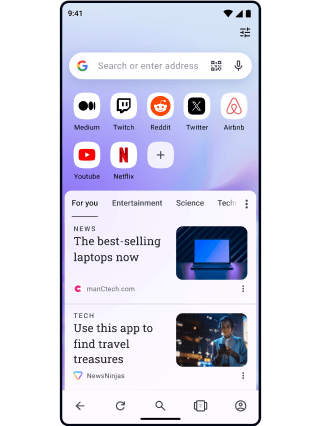
Ad-blocking, tracking protection and a free VPN help make Opera the best web browser.
Opera automatically protects you from phishing, cryptomining, and paste-hijacking.
Messengers, social media apps and music services are integrated in Opera’s sidebar.
Productivity
Opera’s Workspaces, battery saver and Video Pop-out help you browse more smoothly.
Compare web browsers Opera and Chrome
Summary: Opera Browser provides better privacy and security than Google Chrome, without using up your CPU & RAM. And with more advanced productivity features, Opera is more intuitive and efficient compared to Chrome.
RAM/CPU friendly
Tests show that the Opera web browser uses less memory than its competitors, and Opera GX has RAM/CPU limiters built right in. Chrome on the other hand is well-known for using a lot of your memory and CPU capacity by running a large amount of background processes.
Built-in Ad blocker
Opera includes a built-in Ad blocker that prevents your browser from being littered with ads. Plus, when you block ads and popups you’re better protected from malvertising, and webpages load faster. Opera's Ad blocker also lets you unblock ads for any website you want, giving you complete control over what ads you see online. This type of ad blocking feature is not available in Chrome.
Tracking protection
Unlike Chrome, Opera Browser includes a Tracker Blocker that blocks analytic scripts, cryptojacking, tracking pixels and other methods of data collection. Opera’s tracker blocking feature is accessible through the ad blocking shield icon in its address bar, and you can customize lists and exceptions. In settings, you can choose to auto-clear cookies and site data when closing Opera as well as block third-party cookies. In Chrome, third-party cookies can also be blocked in settings, though it doesn't apply to Google itself. Google collects a lot of user data from Chrome by default, and privacy settings are in a separate section (You and Google), where most of the sync features are enabled by default. This includes address bar autocomplete cookies, browsing history, Google Drive content sharing, statistics and crash reports sending.
A VPN (virtual private network) is the most important feature for your online privacy. Opera includes a free browser VPN that provides privacy and security for your browser traffic when activated. It’s free, built right into the Opera web browser, and doesn’t require any subscription or login. Chrome does not have any built-in VPN.
Integrated messengers
Opera has the most popular messengers built right into the web browser . This lets you chat using Facebook Messenger, WhatsApp, Telegram and more directly from your sidebar, no matter which tab you’re using. Chrome does not have integrated messengers.
Browser comparison Opera and Firefox
Summary: Opera is the best browser in terms of privacy, speed, and freedom of customization when compared to Mozilla Firefox. Opera offers more unique features for productivity and lets you access more content directly in your browser.
Music Player
The world of music is at your fingertips without opening another app. Just flip the Player switch on the Opera Browser sidebar and play your favorite music from the most popular streaming services, like Apple Music, Spotify, YouTube Music, Deezer and Tidal, directly in your browser. Firefox does not have this feature.
Built-in Ad Blocker
Opera's built-in Ad blocker ensures your browsing isn’t littered with dozens of ads. And when it blocks ads, web pages load faster and you enjoy more protection from malvertising. Firefox also has a built-in adblocker, but most users opt for a separate extension that works better.
Battery Saver
When browsing on a laptop with no way to plug it in, saving battery life is a great advantage - especially when you need your device for work. Opera Browser’s Battery Saver feature extends your battery life by up to 35% without sacrificing performance. Firefox does not have such a feature.
File sharing
Flow is Opera's custom feature that allows you to securely send attachments (notes, files, images, links) between devices, including your mobile phone. All you have to do is scan the QR code to connect your desktop browser to your mobile version . Anything you send between devices with the Flow feature is encrypted for privacy and security, and is immediately available in your other device’s Opera Browser. Mozilla Firefox used to have a similar feature, but it was discontinued in 2020.
Tab grouping
Do you keep a lot of tabs open at the same time? Opera Browser allows you to group them into separate workspaces so you can organize them by context, like work, shopping, gaming - whatever you want. With one click, you can switch between these groups to keep related tabs together and deal with less at one time. Firefox does not have a workspaces feature, but similar addons can be downloaded for it.
Compare browsers Opera and Edge
Summary: Opera is the best browser for privacy, security and customization. And unlike Microsoft Edge, which you can’t uninstall, you have freedom of choice with the Opera web browser.
Paste protection
Malware exists online that can hijack your clipboard and change the data that you copy and paste. By doing this, hackers can trick you into sending money to their accounts. To prevent this, Opera has included a Paste Protection feature in its browser. When you copy and paste information, Opera’s Paste Protection feature monitors the information for a time, or until you paste it, and warns you if the data is changed. Edge does not have this feature.
Opera Browser comes with Player, a built-in music player, right in the sidebar . Player lets you connect to music services, like Spotify, Apple Music, YouTube Music, Tidal and Deezer, as well as switch between them any time. When you click the Player icon in the sidebar, a handy panel opens up with the music services you’ve connected to, so you don’t have to switch between tabs or windows. Also, when audio starts playing on a webpage, like if you start a YouTube video, the music in Player automatically pauses, then resumes when the other source stops. Microsoft Edge does not have an integrated music player.
A virtual private network protects your online privacy by masking your location and encrypting your online traffic. Opera has a free browser VPN built right into Opera Browser, which doesn’t require logging in or subscribing. Microsoft Edge is currently testing its Secure Network feature, which is quite similar. However, you need to log in with your Microsoft account to enable it. Another difference is that Edge automatically connects to the nearest location, while Opera’s Free VPN lets you choose from a number of locations.
Integrated social media
Opera Browser has social media apps, like Instagram and Twitter , built right into the browser’s sidebar, making it easy to keep up with social media while browsing the web. Once you’ve signed in, you can just click the icon on your sidebar to pop out the app’s panel. This way you can browse, post, and chat without opening new tabs or windows.
Can be uninstalled
Microsoft makes Edge the default browser on Windows devices automatically. While you can change your default web browser through the start menu (default apps), you cannot uninstall Microsoft Edge without deeper technical knowledge. Opera Browser is not the default browser for any device, meaning that its 350+ million users have specifically chosen to download and use Opera.
Compare web browsers Opera and Safari
Summary: Opera Browser provides superior privacy over Safari, with free features that keep you safe online. Plus, Opera’s dedicated features, like browser AI and integrated messengers, allow you to do more and stay connected without leaving your browser.
Opera Browser has a free built-in Ad Blocker hat can be enabled in one click. Opera’s Ad Blocker protects you from malicious ads, keeps your browsing space clean, and makes webpages load faster. You can also unblock ads whenever you want, in general or on specific websites. The Safari browser does not have any built-in ad blocker, but can block pop-ups if you search through settings and enable the function.
Cryptomining protection
Opera Browser blocks crypto mining scripts by default through its Ad Blocker. By preventing crypto mining on your device, Opera saves your device’s speed, battery and processing power. Safari does not block crypto mining scripts. While Safari’s Intelligent Tracking Prevention limits third-party cookies, you would need to rely on third-party extensions to protect against crypto mining.
Opera Browser includes a free browser AI, named Aria , both in Opera for desktop and on Android or iOS. Aria has a chat interface where Aria will provide you with clear answers instantly, saving you from digging through search results and scouring webpages for the information you want. And unlike other AI chatbots, Aria can get information from the web, giving you real-time information that’s not limited to the past. Beyond chatting and answering questions, Aria can generate content based on your requests. Aria’s Compose feature makes this even easier with an interface that lets you assign parameters to the generated content. On Opera for desktop, Aria is available in Opera’s sidebar, or via keyboard shortcut ( Ctrl + / ). On mobile, Aria can be found in the main menu. Safari does not include any AI feature.
The most popular messengers , like WhatsApp , Facebook Messenger and Telegram are built into Opera Browser. Sign into your preferred messenger and access it in one click from Opera’s sidebar to chat easily without leaving your browser. The chat panel can be pinned for browsing and chatting side-by-side. Safari does not have any integrated messengers.

Why is Opera the best browser?
Here’s what users say

10 times faster than Chrome and there’s a built in ad blocker. What more is there to ask for.
Opera user from United States

Finally, NO Ads. Edge was sending me flash adverts so fast I couldn’t get any work done. Opera is a breath of fresh air.
Opera user from United Kingdom

I just switched to Opera from Firefox and it’s a really nice and refreshing browsing experience. Super clean.
Opera user from Poland
You deserve a better browser
Opera's Ad blocker, Player, Lucid Mode and Flow file sharing. Just a few of the must-have features built into Opera for faster, smoother and distraction-free browsing designed to improve your online experience.

Opera Browser vs Safari
Need advice about which tool to choose ask the stackshare community, opera browser vs safari: what are the differences.
Safari and Opera are two popular web browsers used by internet users. Let's explore the key differences between them.
User Interface : Opera features a sleek and modern user interface with a customizable start page, sidebar, and intuitive navigation tools. On the other hand, Safari boasts a clean and minimalist interface with a focus on simplicity and convenience.
Speed and Performance : Opera is known for its speed and performance, providing a fast and efficient browsing experience. Safari, on the other hand, is optimized for Apple devices and offers superior performance and speed, especially on Mac computers.
Compatibility : Opera is compatible with a wide range of operating systems, including Windows, macOS, and Linux. Safari, however, is exclusive to Apple devices and is only available on iOS and macOS.
Privacy and Security : Opera takes privacy and security seriously, offering a built-in ad blocker, tracking protection, and a free VPN for anonymous browsing. Safari also prioritizes user privacy by blocking tracking cookies, offering intelligent tracking prevention, and providing strong encryption for secure browsing.
Extensions and Add-ons : Opera supports a variety of extensions and add-ons, allowing users to customize their browsing experience. Safari, on the other hand, has a more limited selection of extensions and add-ons available, but they are typically well-vetted for quality and security.
Ecosystem Integration : Safari is tightly integrated with Apple's ecosystem, providing seamless syncing across Apple devices and integration with other Apple services. Opera, on the other hand, offers cross-platform syncing and integration with popular social media platforms, making it a versatile choice for users across different platforms.
In summary, Opera, known for its speed and built-in features like a free VPN and ad blocker, is popular among users seeking a customizable browsing experience. Safari, the default browser on Apple devices, is optimized for macOS and iOS integration, offering seamless performance and energy efficiency.
Pros of Opera Browser
- 7 Twitter, Messenger, WhatsApp, and Instagram built in
- 6 Add extensions to sidebar
- 6 Player, and My Flow
- 6 Multiple Workspaces
- 4 Innovative
- 3 Speed Dial Built In
- 2 Add websites integrated to opera
- 1 Highlight search results in web pages
- 1 Search highlight inside site
Pros of Safari
- 4 More secure
- 3 More secure
- 3 Has Mac Extensions
- 3 Shows advanced tracking controls
- 3 Better privacy
- 3 Has fingerprinting
- 2 Awesome for developers
- 2 Way faster than edge
- 1 Good logo
Sign up to add or upvote pros Make informed product decisions
Cons of opera browser.
- 2 Memory hungry
- 1 Developer version might provide a better experience 4 u
Cons of Safari
- 2 Doesn't work on Windows
- 2 Tracks your every move
- 1 Webkit based
- 1 Stingy Apple product
- 1 Not cross-platform
Sign up to add or upvote cons Make informed product decisions
What is opera browser, what is safari, what companies use opera browser.

What companies use Safari?

Sign up to get full access to all the companies Make informed product decisions
What tools integrate with opera browser.

What tools integrate with Safari?

Sign up to get full access to all the tool integrations Make informed product decisions
Related comparisons, trending comparisons, top comparisons.
- Browser Reviews
Cloudwards.net may earn a small commission from some purchases made through our site. However, any earnings do not affect how we review services. Learn more about our editorial integrity and research process .
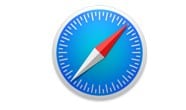
- Usually pretty fast
- Intuitive user interface
- Default for Mac & iOS
Safari Review
Safari is Apple's native browser for Mac and iOS. The browser marketplace has become pretty competitive, and there are a host of other browser options you could use instead of Safari. But the question is, should you? Read our Safari review to find out.

All Mac and iPhone users will be familiar with Safari — it’s Apple’s native web browser and has been around since 2003. Apple has taken Safari through 15 major updates, but that’s not to say it’s the best browser out there. After all, the browser market is a competitive one. Should Safari be the go-to for Apple users? Well, read our Safari review to decide.
There’s a lot we like about Safari — both on Mac and iPhone. It’s straightforward to use, integrates well with Apple’s applications and looks sleek and crisp. However, Safari is far from perfect, with the lack of browser extensions being a particular weakness.
Key Takeaways:
- Safari is the native browser for Mac and iOS devices. It’s got a clean design and is straightforward to use.
- Safari ranks pretty high for privacy and security, but it lacks the customizable features and add-ons that you get with other browsers.
- The big win for Safari is its integration capabilities. It syncs effortlessly across your Apple devices and you can use Apple Pay in-browser.
Ultimately, our take on Safari is that it depends on what you need. If you’re a lover of Apple devices who wants to browse the web for fun and research purposes, then Safari is probably enough. However, if you’re looking for a personalized, customized and enhanced web browsing experience, you may want to consider other providers.
Cloudwards completed a fresh review of Safari. Since our last review, Safari has updated its design, but its features remain unchanged. Testing: MacBook running OS Monterey and an iPhone running iOS 14.8.1.
Safari Review: Alternatives

Safari Review: Strengths & Weaknesses
- Usually pretty fast
- Intuitive user interface
- Default for Mac & iOS
- Limited extensions library
- Only available on Apple
- Customization not obvious
Safari encourages continuity. One of its standout features is the fact that, if you’re an iPhone, iPad and Mac user, you can work seamlessly across your Apple devices. This is because Safari takes advantage of iCloud syncing features. Essentially, rather than storing data locally on your device, Safari stores your data in the cloud.
If you’re signed in with your Apple ID across your Apple devices, you can switch from device to device without your browser session being interrupted (to an extent). For example, you can favorite a web recipe on your phone and then access it on your Mac.
We also like that you can sync passwords across your devices — although, this isn’t actually down to Safari, but Apple’s iCloud Keychain software.
While this interoperability is a definite benefit, it has its limitations. Sure, favorite websites and bookmarks transfer, but you can’t sync your settings or open tabs across devices.
Features on Mac
Safari covers the essentials well for Mac devices. It has a sleek, minimalist design and is intuitive to use on a desktop. While there are customization features, they’re kind of muted and hard to find.
In the right-hand corner of the browser start page, you’ll find a settings icon that enables you to lightly edit the appearance of your start page — whether you view your favorites, privacy report and so on. You can also upload your own background image from the start page.
These few features are pretty basic — and so is the functionality of the desktop browser. While it’s good for basic browsing, if you want to harness the power of a library of extensions, Safari falls short.
That’s not to say that Apple doesn’t offer extensions for Safari. It does, but the library certainly isn’t as vast as open-source competitors like Firefox ( read our full review of Firefox here).
There are big names in the Apple extension store that are perfect for consumer browsing — we were able to install well-known favorites like Honey, 1Password and Grammarly. However, a lot of Safari’s extensions are, well, built for Safari. Apple’s app store has a bias to it, whereby a lot of the extensions are available only for Safari.
If you’re an Apple devotee, there’s nothing to worry about — especially if you’re a family of Apple users. We like that the company has robust parental control settings that are easy to customize.
Parents can easily configure a secure browsing experience for their children without having to download any extensions. We have a comprehensive guide on how you can set parental controls on iPhones and iPads.
On Mac, for example, you can do this by clicking “system preferences” and then the screen time icon. Once on this page, you can select controls relating to app restrictions, content restrictions and downtime.
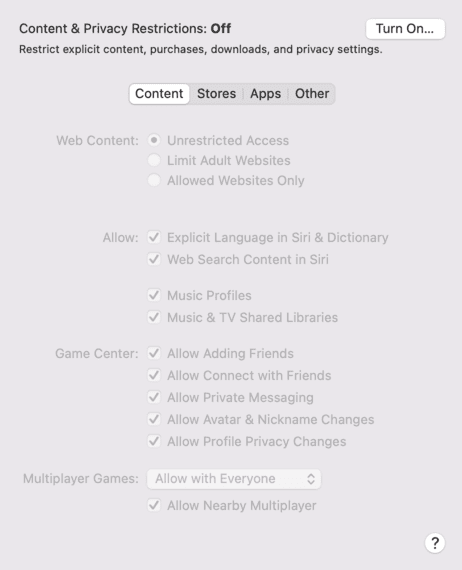
Features on iOS
Safari is also solid on iOS, although it lacks the wow factor of competitor home screens like Google Chrome. While the Chrome mobile app, for example, automatically shows you the latest trending news on the home screen, Safari opens up as a gray, static canvas of your favorite websites and frequently visited pages.
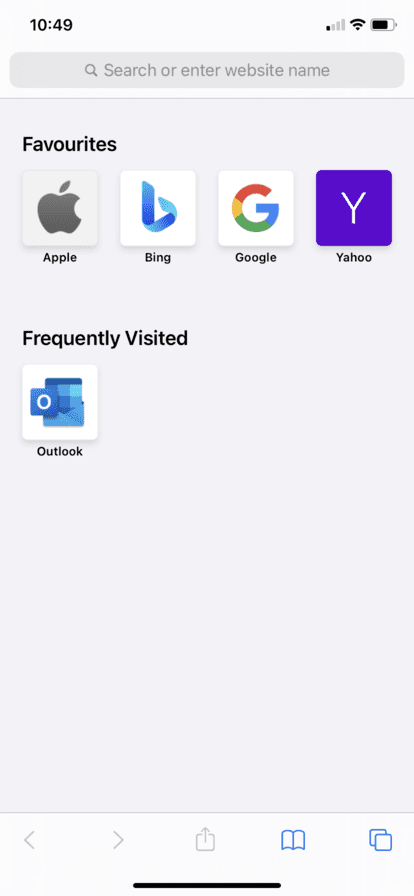
We don’t want to imply that this is a bad thing, though. It all depends on what you’re after from your mobile browsing experience. Moreover, iOS shines in its syncing and communication capabilities. If you see a website or article you like, you can easily share it with your phone contacts in just a couple of clicks across applications like WhatsApp, Instagram and Facebook.
You can also easily bookmark iCloud tabs, add them to favorites and save them to your home screen with a single tap for later use.
Ease of Use
Safari’s interface is a bit like Marmite — you either love it or you hate it. Mac devotees will likely find Safari intuitive to use, but that’s partially due to previous experience with Safari. Because it comes preloaded on Apple products, there’s no learning curve.
For Chrome users, the Safari start page could be a little jarring. Gone are the bells and whistles of a center-space search bar and the latest news stories. Instead, you’re greeted with a minimalist gray interface featuring your reading list, favorite pages and a block of your most visited sites.
Ease of Use on Mac
Safari’s user interface is pretty easy to get your head around. The address bar is at the top of the screen, and your tabs appear underneath it in chronological order. Above the address bar, you can find all the usual suspects that you’d expect from a browser, like your history, bookmarks and edit options.
One nice feature is the “tab overview” function in the top right-hand corner, which zooms you out of your tabs so you can see all your sites at a high level. If you’re someone who uses lots of research tabs for school or work, this is really handy.
Another slightly hidden feature of Safari for Mac is the tab group feature. In the top left-hand corner of the Safari screen, you’ll see a page icon. Click this and a panel will appear on the left-hand side of your page. From this panel, you can create tab groups, where you can save a group of web pages to be opened at a later date.
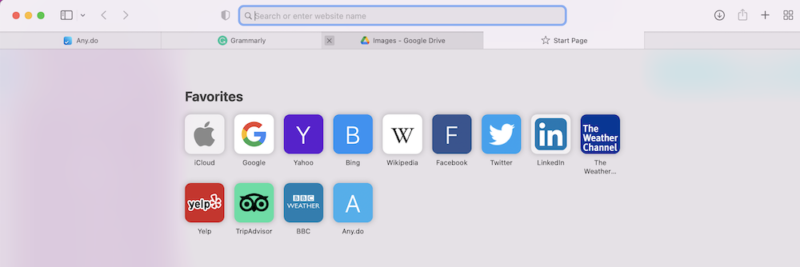
Ease of Use on iOS
It’s a similar story on iOS. The layout of Safari for mobile devices is intuitive and simple, with a search engine function embedded at the top of the homepage. The one downside of Safari on iOS is that tab management is a little clunky.
Every time you open a new tab, it gets added to a card deck tab list, which can easily become overwhelmingly long if you’re not careful about closing tabs that you no longer use.
While apps like Chrome will let you know how many tabs you have open, it’s a bit of a guessing game with Safari and it’s easy to lose track if you click links with websites that open new tabs.
Safari offers a private browsing option that’s super easy to find — we would say easier to find than in its mobile app competitors. By tapping the “open new tab” option, you’ll automatically see a “private” browsing option in the bottom left-hand corner of your mobile screen.
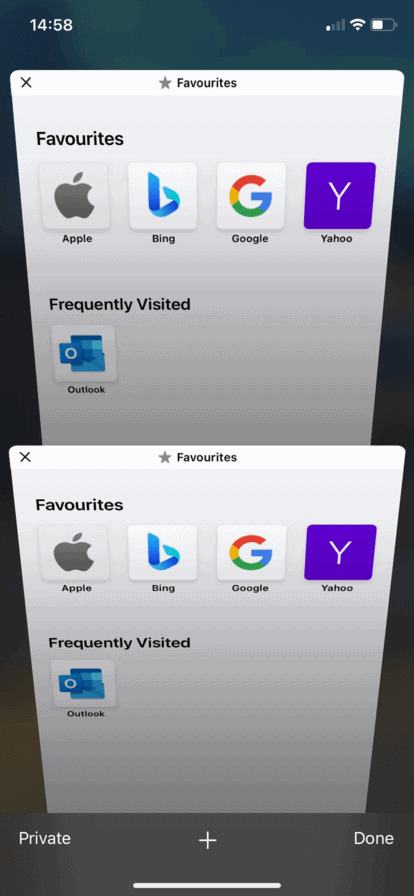
Safari’s Integration With Apple Devices
So far, Safari seems to be doing OK in the browser game, but Apple really makes up for things when it comes to its native browser’s integration capabilities. Apple Pay, for example, is one of the best features of using Apple. With macOS expMonterey on a relatively new MacBook Pro, we can use Safari to pay for transactions with a quick and effortless touch ID feature.
It’s a similar picture on iPhone, where Safari and face ID combine for an effortless checkout experience. Of course, this functionality depends on the e-commerce website you visit. Not all merchants offer Apple Pay, but it is a nice touch when they do.
Saying this, we’re also aware that most browsers give you the option to save your credit card details, but there is something glitzy about the touch ID and face ID capabilities of Safari and Apple Pay that appeals — even if it is slightly gimmicky.
We also like that Safari enables you to effortlessly email or call a website you’ve visited by clicking these details. On iOS, you’ll be able to immediately call the number; on Mac, the email address will open up in Apple Mail.
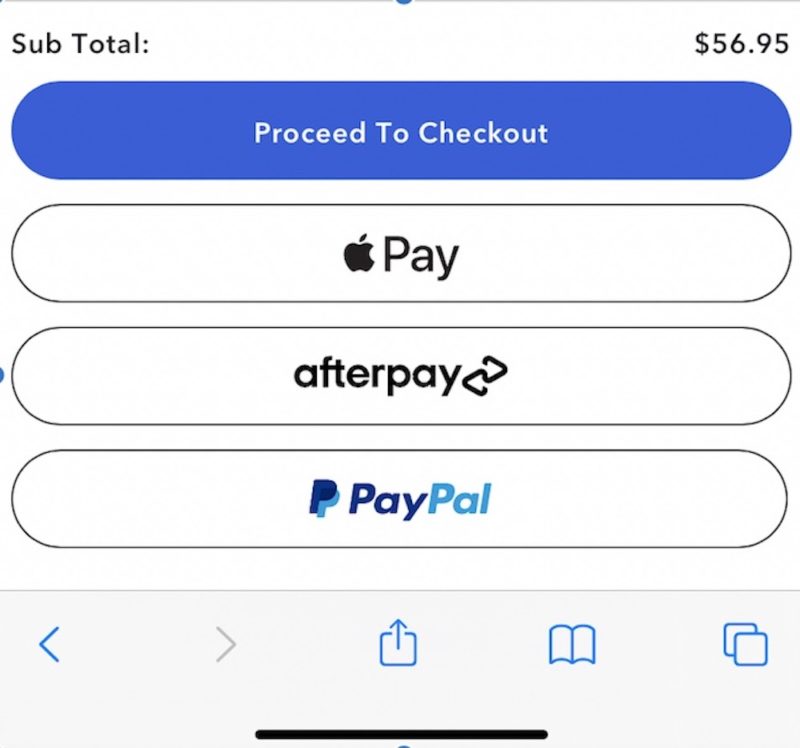
Performance
Safari’s performance is, for the most part, superb on both Mac and iOS. We tested Safari’s speed, compared to Chrome on Mac, to see how it performed.
We used BrowserBench’s trio of tests — Speedometer 2.0, JetStream 2 and MotionMark — each of which analyzes a different aspect of the browser. Read our review of the fastest browsers here.
We performed the tests on a MacBook Pro with 16GB of RAM and an Intel Core i5 CPU running at 2 GHz. It’s worth noting that the strength of your internet connection can impact the browser speed, so keep that in mind when reviewing the results, which were as follows.
Benchmark Test Results
With Speedometer, Chrome came up tops. Its reading was 122.05, compared to Safari’s 113.8. This means Chrome is the faster option, but Safari is still pretty speedy. The difference is negligible and we haven’t noticed it with either browser.
On JetStream, Chrome came in at 118.675, with Safari taking a slight lead with a reading of 125.705. This indicates that Safari is solid for handling more complex JavaScript workloads.
However, with MotionMark, which tests the graphics capabilities of the browser, Safari’s result was 356.31, while Chrome’s was 403.6. MotionMark is all about testing the user experience — how a browser responds and performs in terms of graphics and responsiveness.
Safari’s Improved Performance on Apple Devices
While Chrome takes the lead here, we have to say that we haven’t noticed a clear difference in the user experience while using Chrome compared to Safari. Although, if you’re into gaming on your browser, you may find Chrome preferable.
So, while Chrome may be faster, Safari’s performance is still excellent. From an efficiency perspective, Safari is also better than other browsers that are based on Chromium (take a look at our Chromium review ). This is because of Safari’s lightweight design, which means it needs less RAM than other providers.
This difference is exemplified the most by tab usage. If you’re familiar with the MacBook Pro “fan whir,” then be wary of opening too many Chrome tabs at once.
While we can open an unlimited number of Safari tabs without experiencing the whir, if we open too many Chrome tabs, it will trigger the Mac’s fan. If you want more on the battle of Chrome vs Safari, read our full review .
Safari isn’t bad in terms of security, but it’s not amazing either. While the browser uses Google’s Safe Browsing database to prevent phishing and malware, its pop-up ad blocker seems to fall short.
We’ve visited many news websites and found that ads have interrupted our browsing experience. We’d recommend downloading an additional pop-up ad blocker extension to impede this.
Another thing to bear in mind is that Safari’s updates are few and far between. While competitor search engines like Google Chrome mandate security updates roughly every two to three weeks, Safari security updates are less frequent at anywhere between four and six weeks.
These security updates tend to contain critical patches that correct vulnerabilities in the browsing software. Left too long without a patch, cybercriminals could take advantage of these security weaknesses, which is why we recommend using the best VPN for Safari .
Finally, as noted earlier, Safari’s integration with Apple devices makes password management super simple. You don’t need to install an extra password manager; Safari automatically stores your passwords in the iCloud Keychain.
As an added bonus, Safari also features dark web monitoring. This alerts you if your password or email address has appeared in a data breach, and asks you to change the password.

Hidden in Safari’s “preferences” section are a range of basic privacy features that are automatically enabled, such as tick-box options to prevent cross-site tracking, hide your IP address and block all cookies.
Safari doesn’t boast these features. You have to look to find them. but it’s encouraging to know that they are enabled by default, as opposed to users having to opt in for better privacy.
On your start page, you’ll even see a feature called “privacy report,” which highlights how Apple’s Intelligent Tracking Prevention functionality has identified and blocked website trackers from tracking you.
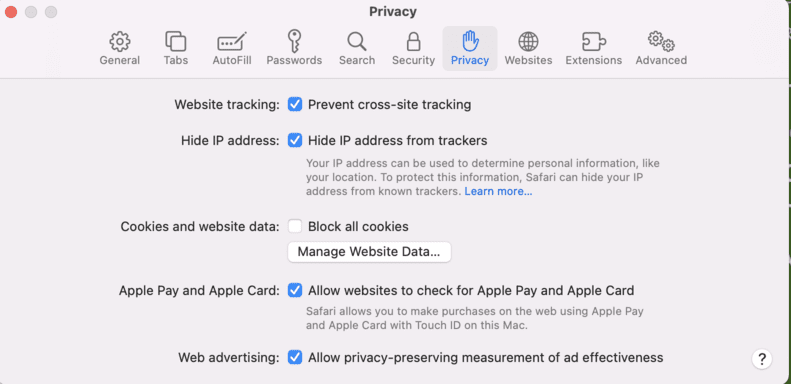
Safari Browser Review: The Verdict
Ultimately, Safari is a robust browser choice for both iOS and Mac users. If you’re a big Apple fan, then using Safari makes sense for basic browsing — especially given its seamless integration with other Apple functions like iCloud and Apple Pay.
However, if you’re looking for high degrees of customization and personalization, then Safari’s minimalist interface and handful of extensions will feel limiting.
We’d love to know what you think of Safari. How do you think it compares to other browsers? Is Safari your go-to browser, and if so why? Let us know in the comments! Thank you for reading.
Safari feels intuitive to use and covers the basics well. However, it lacks the features and vast extension libraries of its competitors.
Safari is pretty secure because it uses Google’s Safe Browsing database to protect you from phishing and malware. It also automatically blocks suspicious websites and pop-ups by default.
This depends on your needs. If you’re looking to add a range of extensions to your browsing experience, or are particularly security conscious, you’ll be better off with Google Chrome. However, if you are an avid Apple fan and want a fast, seamless user experience across all your Apple devices, Safari won’t disappoint.
Safari isn’t outdated in our view. It offers a range of elements that make it perfect for day-to-day browsing needs.
I love Safari! However,I have a problem going into Safari when I updated something on my iPhone
Safari 16.0 does not update websites that has been just updated by myself. It shows web page that was downloaded initially.
After the update, Safari doesn’t load on my homepage. I work back & forth and need it located in my dock & minimize on my homepage.
I like Safari it suits me
I have given up running Safari on my Airbook with the M.2 chip. With nearly every update to the Sedona operating system, Safari stops working (locks up repeatedly) for several weeks. I have switched to FireFox for less problematic browsing.
Safari is displaying the menu items on my website vertically, when the menus are designed to display horizontal. Does anyone know a fix for this?

- Safari vs Chrome in 2024: Performance, Speed and Features Compared
- How to Use Surfshark in 2024: Easy Step-by-Step Instructions

Because the Cloudwards.net team is committed to delivering accurate content, we implemented an additional fact-checking step to our editorial process. Each article that we fact check is analyzed for inaccuracies so that the published content is as accurate as possible.
You can tell that an article is fact checked with the Facts checked by symbol, and you can also see which Cloudwards.net team member personally verified the facts within the article. However, providers frequently change aspects of their services, so if you see an inaccuracy in a fact-checked article, please email us at feedback[at]cloudwards[dot]net. We strive to eventually have every article on the site fact checked. Thank you.
Download Free
Opera GX vs Safari: A Comprehensive Browser Comparison
It's free and super easy to set up
Choosing a web browser is a significant decision in our digital age. With countless browsers available, finding one that satisfies your unique requirements can be challenging. In this article, we will compare two popular browsers, Opera GX and Safari, providing an in-depth analysis of their functionality, strengths, and weaknesses.
Introduction to Opera GX and Safari
When it comes to browsing the internet, there are a multitude of options available. However, two browsers that stand out from the rest are Opera GX and Safari. Both of these browsers have unique features that make them stand out from the crowd.
Opera GX is a browser that is designed with gamers in mind. One of the standout features of Opera GX is its ability to limit RAM and CPU usage. This means that you can browse the internet without worrying about your computer slowing down due to excessive resource usage. Additionally, Opera GX has in-built Twitch integration, which allows you to watch your favorite streamers without having to switch between tabs.
Another feature that sets Opera GX apart from other browsers is its gaming-inspired design. The browser has a dark color scheme and neon accents, which gives it a unique and modern look. Additionally, Opera GX has a feature called GX Corner, which is a curated selection of gaming news and deals.
Safari is a browser that is known for its seamless integration with Apple devices. If you own an iPhone, iPad, or Mac, Safari is the default browser that comes pre-installed on these devices. One of the standout features of Safari is its strong security protocols. Safari is designed to protect your privacy and keep your data safe while you browse the internet.
In addition to its security features, Safari is also known for its speed and efficiency. The browser is designed to be lightweight and fast, which means that you can browse the internet without any lag or slowdowns. Safari also has a feature called Reader View, which removes ads and other distractions from web pages, making it easier to read articles and other content.
Both Opera GX and Safari have unique features that make them stand out from other browsers. If you are a gamer, Opera GX is the perfect browser for you, with its RAM and CPU usage limits and in-built Twitch integration. On the other hand, if you value security and privacy, Safari is the browser for you, with its strong security protocols and seamless integration with Apple devices. Ultimately, the choice between these two browsers comes down to your specific needs and preferences.
Opera GX: The Gaming Browser
Opera GX is a browser that is specifically designed for gamers. It has been created to prioritize the performance of the browser by limiting the usage of RAM and CPU, which is essential for gamers who need to allocate their resources wisely. The browser also offers Twitch integration, which means that streamers can manage their streams without leaving the browser, making it a convenient tool for gamers.
But Opera GX is not just for gamers. It offers many essential browser features, such as tab management, customizable layout, and ad-block capabilities. The browser is also equipped with an integrated messenger service and workspaces, which allow users to keep their work and personal life separate and organized.
Key Features of Opera GX
Opera GX has many features that make it stand out from other browsers. One of these features is the ability to customize the browser's layout. Users can change the colors, themes, and layout to suit their preferences. This makes it a highly personalized browser that can be tailored to the user's needs.
Another feature of Opera GX is its ad-block capabilities. This feature allows users to block ads on websites, which can significantly improve the browsing experience. The browser also has a built-in VPN, which can be used to protect the user's privacy and security.

Opera GX Performance and Speed
Opera GX is a fast and optimized browser that is ideal for gaming. It has several performance features that make it stand out from other browsers. One of these features is the Easy Setup feature, which allows users to optimize their performance settings with one click. This feature can significantly improve the browser's speed and performance.
Another performance feature of Opera GX is the network limiter, which can set limits for data usage on a per-tab basis. This feature is useful for gamers who want to prioritize their bandwidth usage and ensure a smooth gaming experience.
Customization and User Experience
Opera GX is a browser that is designed to provide a unique and personalized experience for its users. The browser's design is inspired by gaming and features unique animations and sound effects. This makes it a fun and immersive browser to use.
The browser's highly customizable interface is another feature that makes it stand out from other browsers. Users can change the browser's colors, themes, and layout to suit their preferences. This makes it a highly personalized browser that can be tailored to the user's needs.
In conclusion, Opera GX is a browser that is designed with gamers in mind, but it offers many features that make it suitable for all users. With its performance and speed features, customization options, and unique user experience, Opera GX is a browser that is worth considering for anyone who wants a fast, personalized, and immersive browsing experience.
Safari: Apple's Default Browser
Safari is Apple's default browser, and it is known for its advanced security protocols and seamless integration with Apple devices. Safari was first introduced in 2003 and has since become one of the most popular browsers worldwide.
One of the main reasons why Safari is so popular is because it is pre-installed on all Apple devices, including iPhones, iPads, and Macs. This means that users do not have to go through the hassle of downloading and installing a separate browser.
Key Features of Safari
Safari's notable features include an intelligent tracking protection system, privacy preferences, built-in password manager, and synchronization across multiple Apple devices using iCloud. The intelligent tracking protection system prevents advertisers from tracking your online activity and collecting data without your consent. This is particularly useful for users who are concerned about their online privacy.
The built-in password manager is also a great feature of Safari. It securely stores your passwords and automatically fills them in for you when you visit a website that requires a login. This saves you the hassle of having to remember multiple passwords.
Safari Performance and Speed
Safari is known for its exceptional performance and benchmark speeds, which is attributed to its efficient resource management and proprietary optimizations. Safari is designed to use less memory and CPU power than other browsers, which means that it runs faster and smoother on older devices.
Additionally, Safari has a feature called "Tab Preview" that allows users to preview the contents of a tab without actually opening it. This feature saves time and resources, as it prevents unnecessary tabs from being opened.
Privacy and Security in Safari
Safari is known for its robust privacy and security protocols. Intelligent tracking protection, sandboxing, and password auditing are examples of its security features. The intelligent tracking protection system prevents advertisers from tracking your online activity and collecting data without your consent. Sandboxing is a security feature that isolates web pages and plugins in a separate process, which prevents malicious code from affecting the rest of your system.
Additionally, Safari has built-in privacy preferences, including the ability to mask your IP address. This is useful for users who want to browse the web anonymously. Safari also has a feature called "Private Browsing" that allows users to browse the web without saving any history or data.
In conclusion, Safari is a powerful and secure browser that is perfect for Apple users. Its advanced security protocols, robust privacy features, and exceptional performance make it a great choice for anyone who values their online privacy and security.
Comparing Opera GX and Safari
When it comes to choosing a browser, there are several factors to consider. Let's dive deeper into the comparison between Opera GX and Safari to help you decide which browser is better suited to your needs.
Performance and Speed
When it comes to performance and speed, both Opera GX and Safari are highly optimized and fast. However, Opera GX has some performance features that give it an edge over Safari. Opera GX has a built-in RAM and CPU limiter that lets you allocate system resources to the browser, ensuring that other apps and programs don't slow down while you're browsing. Additionally, Opera GX has a gaming mode that optimizes the browser's performance for gaming, reducing lag and increasing FPS. Safari, on the other hand, is known for its fast page loading speed and energy efficiency on Apple devices.
When it comes to customization, Opera GX offers a more personalized experience than Safari. Opera GX has a range of customization options, including the ability to change the browser's color scheme, wallpapers, and sound effects. Additionally, Opera GX has a sidebar that lets you access frequently used tools and websites, making browsing more efficient. Safari, on the other hand, has limited customization options, but it has a clean and minimalist user interface that is easy to navigate.
Privacy and Security
Both Opera GX and Safari prioritize privacy and security by implementing a range of security features. Opera GX has a built-in VPN that encrypts your internet connection and protects your online privacy. It also has a feature called "My Flow" that lets you securely share files and links between your devices. Safari, on the other hand, has advanced privacy and security measures, such as Intelligent Tracking Prevention, which blocks third-party trackers and prevents advertisers from tracking your online activity. Safari also has a feature called "Sign in with Apple" that lets you log in to websites and apps securely without revealing your personal information.
Cross-Platform Compatibility
Opera GX is compatible with Windows, Mac, and Linux, making it a versatile browser that can be used on different operating systems. Safari, on the other hand, is only available on Apple devices, including Mac, iPhone, and iPad. If you're using multiple devices with different operating systems, Opera GX may be a better choice for you.
In conclusion, both Opera GX and Safari are great browsers with their unique features and strengths. Ultimately, the choice between the two depends on your personal preferences and needs. If you prioritize performance and customization, Opera GX may be the better choice for you. However, if you value privacy and security, Safari may be the way to go. Regardless of your choice, both browsers offer a fast and secure browsing experience that will enhance your online experience.
When it comes to choosing a browser, there are a lot of factors to consider. Opera GX and Safari are two popular options, each with their own set of pros and cons.Let's start with Opera GX. One of the biggest advantages of this browser is its optimal performance and speed for gaming. If you're a gamer, you'll appreciate the advanced features that Opera GX offers, such as the ability to limit CPU and RAM usage. Additionally, Opera GX has a sleek and modern design, with advanced customization options that allow you to personalize your browsing experience.However, there are also some downsides to Opera GX. For one, it has fewer security features than Safari. While Opera GX does have some built-in security measures, it may not be the best choice if you're looking for a browser that prioritizes privacy and security. Additionally, because Opera GX is not as widely used as some other browsers, there may be limited browser support for Safari's unique features.Now let's turn our attention to Safari. One of the biggest advantages of this browser is its exceptional privacy and security features. Apple has a reputation for prioritizing user privacy, and Safari is no exception. It includes features like Intelligent Tracking Prevention, which blocks third-party trackers from following you across the web. Additionally, Safari seamlessly integrates with other Apple devices, making it a great choice if you're an Apple user.However, there are also some downsides to Safari. For one, it has limited availability. While it's the default browser on Apple devices, it's not available on other operating systems. Additionally, Safari has limited customization options compared to some other browsers. If you're someone who likes to tweak every aspect of your browsing experience, you may find Safari to be too restrictive.Ultimately, the choice between Opera GX and Safari comes down to your personal preferences and priorities. If you're a gamer looking for optimal performance, Opera GX may be the better choice. But if you prioritize privacy and security, and you're an Apple user, Safari may be the way to go.
Which Browser is Right for You?
Considerations for gamers.
If gaming is your primary concern, Opera GX is the obvious choice. With its gaming-focused features and exceptional performance, Opera GX offers everything a gamer needs to maximize their gaming experience.
Considerations for Apple Users
If you are an Apple device user and looking for a secure browser with seamless integration, Safari is the ideal choice. Its strong security features, password management, and iCloud synchronization make it a popular choice for most Apple device users.
Considerations for Privacy and Security
If privacy and security are your primary concerns, then Safari is the best option. Its intelligent tracking protection and advanced security protocols make it one of the most secure browsers available.
Conclusion: Opera GX vs Safari
In conclusion, both Opera GX and Safari are excellent browsers with unique features to offer. Opera GX is ideal for gamers and users looking for a highly personalized experience, while Safari is best suited for Apple users and those searching for the most secure browsing experience possible. Hopefully, this article has guided you towards making an informed decision regarding which browser to use.
Let's set you up !
Working on the web!
Student Tips
Startup Tools
Browser Glossary
Browser Tips
- Accessories
- Entertainment
- PCs & Components
- Wi-Fi & Networks
- Newsletters
- Digital Magazine – Subscribe
- Digital Magazine – Info
- Smart Answers
- Back to School
- Best laptops
- Best antivirus
- Best monitors
- Laptop deals
- Desktop PC deals
When you purchase through links in our articles, we may earn a small commission. This doesn't affect our editorial independence .
Browser comparison: How the five leaders stack up in speed, ease of use and more
The best browser for your desktop could be one you’re not using. Whether Chrome, Firefox, Internet Explorer, Opera, or Safari is your current choice, our tests found distinct differences in speed and ease of use. We also compared how each browser uses system resources, a near-invisible trait that could be discreetly bogging down your PC. For the online lifestyle, the right browser could save you time and frustration.
See how they run
Browsers largely look and act the same: They render HTML in multiple tabs or separate windows, let you bookmark pages, support HTTP and FTP file transfer, or offer private browsing (no data is stored). Deep inside each one, however, are operational differences that may or may not fulfill your needs.
Opera had a long-standing and well-deserved reputation for being fast, but not rendering all pages correctly. A switch from a proprietary HTML layout engine to free and widely-used WebKit (currently version 537 as with Chrome) has made that a thing of the past.
Internet Explorer has a history of being exploited by bad guys, both because of its immense popularity and its ActiveX technology. Give Microsoft credit: It’s doggedly improved the Trident layout engine, adopted standards, and improved security. IE is no longer something I advise users to avoid.
Firefox is a longtime worthy IE competitor, and Chrome’s a strong newcomer. As Safari was installed with iTunes for years, many Windows users have it, but have never tried it—possibly because Apple has never given it a truly Windows-like look.
I’ll be comparing browser performance and resource usage as well as features and ease of use.
Chrome 36 (WebKit 537): Stable and speedy

Google’s Chrome browser has gained traction quickly against longstanding competitors like Internet Explorer.
A lot of people use Google’s Chrome browser, because lots of people use Google’s search engine. Chrome is fast and generally reliable. It was my go-to for a couple of years, partly because of a great text-to-speech add-on called SpeakIt! that I used to proofread articles. Recently, however, it revealed a propensity for playing the video and audio portion of some popup windows without actually showing the popup. This is an interaction with Adobe’s Flash player that also currently affects Firefox.
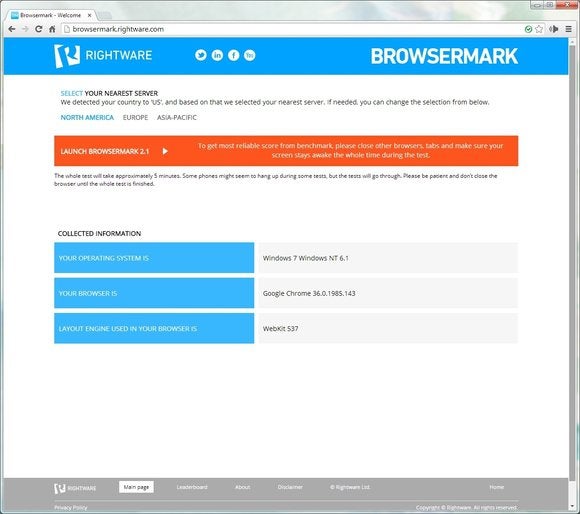
Chrome posted the fastest Browsermark score in our browser comparison tests.
There’s no denying that Chrome is fast: It scored 5773 on Browsermark, took 150.4ms to complete Sunspider, and scored 5627 on Peacekeeper. That’s two first places and a third. To achieve those results, however, it uses a lot of memory and separate processes: 775MB and 14 processes in my hands-on, nine tab test. And there was nothing special going on in any of the tabs.

Chrome is one of the fastest browsers for rendering HTML, but it spawns a lot of processes to achieve that.
Additionally, relatively simple options such as changing your homepage are distinctly unintuitive. You might even get the feeling that Google doesn’t want you to change things. Another issue with Chrome, as well as Opera and IE, is that it spawns a number of processes, making it harder to shut down when things go bad.
Minor issues aside, Chrome is still a top browser option because of its stability and speed.
Firefox 31 (Gecko): Looking good, running fast
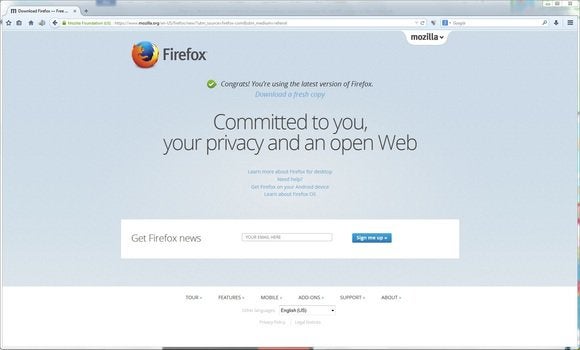
Mozilla Firefox just got an interface makeover and offers many useful add-ons.
Firefox is the long-time competitor to IE that staved off a Microsoft browser monopoly for years until Chrome showed up to “help.” It’s fast and very reliable. Despite a longstanding memory leak that forced the occasional restart, it was the browser I recommended for many users to avoid the malware attacks that once plagued IE.
The memory leak in its Gecko rendering engine seems to be gone and Firefox has recently received an upgrade that was radical enough to rile a few longtime users. (There is a way to bring back the old-style menus.)
I prefer the new look and find it the most intuitive of all the browsers for bookmarking and changing options. Firefox also has a vast array of add-ons, including one of the best video downloaders out there, the aptly-named DownloadHelper.
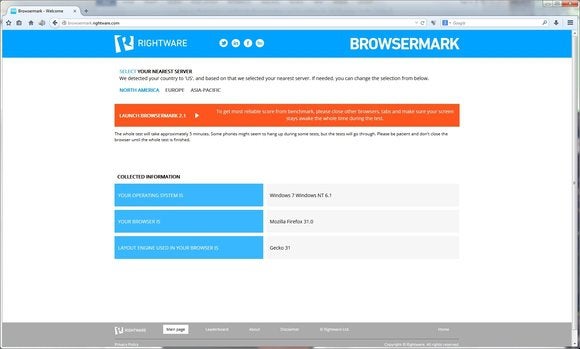
Firefox was the slowest among the browsers we compared in Browsermark, though its score was still decent.
In our performance texts, Firefox tucked neatly into third place overall: It scored 4540 in BrowserMark; took 134.4ms to complete Sunspider (better than Chrome or Opera); and scored 3956 in Peacekeeper.
The feel is slightly slower than Chrome or Opera, but not enough that it should irritate you. It uses fewer resources than Chrome or Opera, spawning only a single process, and using only 510MB of memory. Only the super-thrifty Safari used less memory.
Keep reading for details on Internet Explorer 11 and more …
Internet Explorer 11 (Trident)
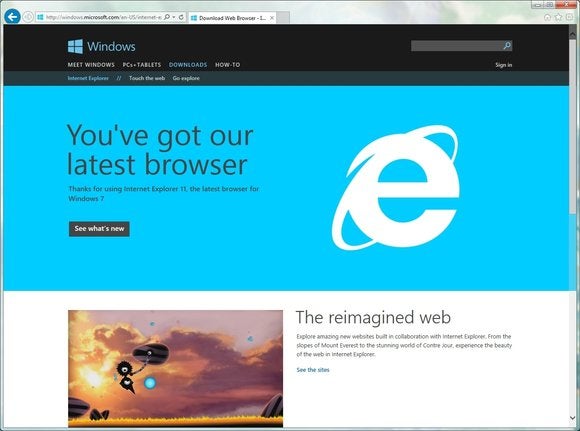
Internet Explorer remains the most widely distributed browser, and the one most targeted by malware.
IE remains extremely popular and useful—if for nothing else that downloading your browser of choice with a fresh install of Windows. It’s decently fast with HTML, exceptionally fast with Javascript, and renders pages reliably.
Also, because of its ActiveX technology, IE is sometimes easier to use with business-related sites such as Webex and HTML IT consoles such as Kaseya. These sites can seamlessly integrate their functionality into IE. With other browsers you must sometimes download and install an extension or background app. Windows User Account Control can prolong that process, so in a pinch I often simply switch to IE.
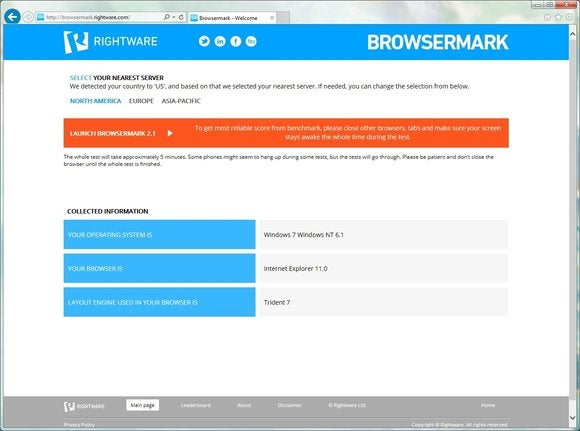
Internet Explorer 11 can be easier to use with business sites because of its ActiveX technology.
IE was unable to complete BrowserMark, a problem noted only after a recent update, but it did score 3670 on Peacekeeper. More notably, it took a mere 74.1ms to complete Sunspider, making it easily the fastest browser for running Javascript.
Sadly, it’s every bit the memory hog that Chrome and Opera are, using 714MB in my nine-tab test. On the other hand, it used “only” 7 processes, half that of the WebKit-based Chrome and Opera.
Opera 23 (WebKit 537)
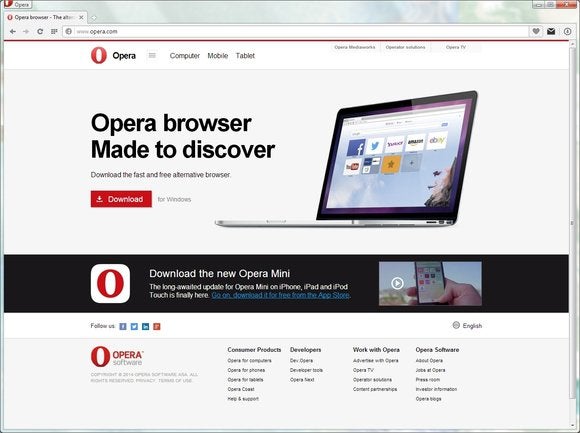
Among the browsers we compared, Opera is worth a look for its easy configuration.
After a long, dark age of badly rendered pages, Opera’s now near-perfect in that regard. I say this even after uninstalling it just a few months ago due to its incompatibility with PCWorld’s own web tools. Updates have smoothed out those kinks, and it’s only a hair slower than Chrome.
Unlike Chrome and Firefox, Opera 23 doesn’t suffer invisible popups. It does use the same Webkit engine and run as multiple processes, and it’s more difficult to shut down. It also lacks a home button, instead relying solely on a launch page of oft-used sites (Speed Dial).
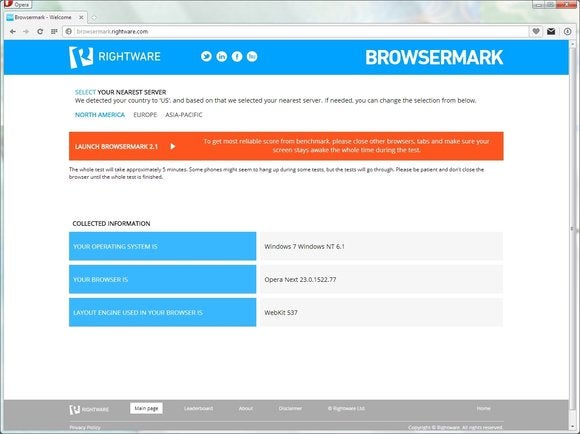
In our browser comparison running Browsermark, Opera was nearly as fast as Chrome.
Speed Dial is great if you work off of multiple sites, but it adds another step for those who work from a single page. My minor complaint: There’s no native feature for emailing a link to a page. You must install an extension for this functionality.
For HTML rendering, Opera was only a hair slower than first-place Chrome, scoring 5625 on BrowserMark and 5447 in Peacekeeper. It was a hair faster with Javascript, completing the Sunspider test in 150.1ms. Overall, you’d be hard-pressed to notice the difference between the two WekKit 537-based browsers in a hands-on.
Despite the list of minor complaints, Opera is currently my main work browser because it’s nearly as fast as Chrome, but easier to configure.
Safari 5.1.17 (WebKit 534)
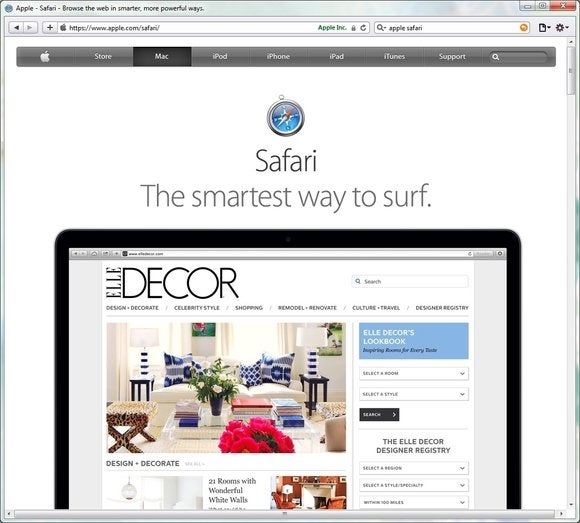
Among the browsers we compared, Safari is easy to use and runs with very low processing overhead.
Though king on the Mac, Safari is probably the least popular of the top browsers under Windows—a bit sad as it’s competent, easy to use, and light on the memory profile. Apple apparently ceased supporting Windows as of version 5.1.17, but we tested it anyway because of its thrifty use of memory.
And ‘thrifty’ is understating the case. It spawns only a single process and in my nine-tab hands-on test, required only 115MB of memory to display it. What happened between the WebKit 534 that Safari uses, and WebKit 537, the current choice of Chrome and Opera is quite amazing. The latter offers way more speed but sucks up a lot of resources.
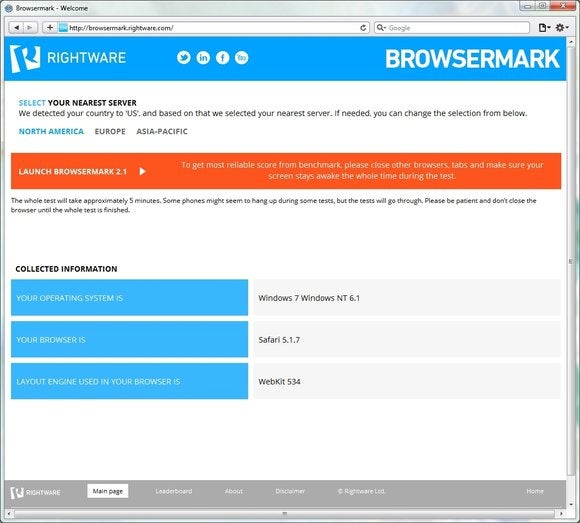
Safari posted a slower score in Browsermark than most of the competition, but it’s still reasonably peppy.
Safari could be very handy on older systems with only 512MB or 1GB of memory. It has all the standard features found in the others, so you’re not giving away anything.
Performance in BrowserMark and Peacekeeper was decent: 4831 and 3062, respectively. It lagged in the Sunspider Javascript test, with a score of 179.9ms.
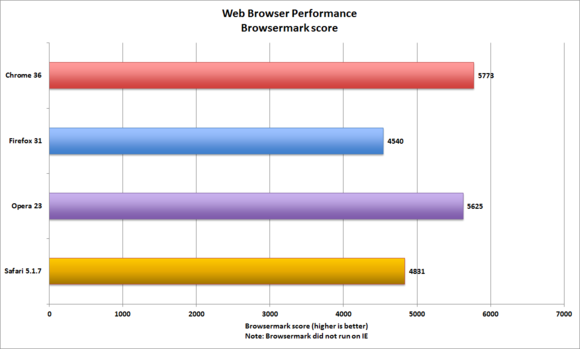
In our browser comparison, the Browsermark test showed pretty close performance by all products (except IE, which Browsermark could not run).
Test Results
To gauge each browser’s rendering performance, we ran Rightware’s Browsermark and FutureMark’s Peacekeeper HTML5 tests, as well as the Sunspider Javascript benchmark.
If you want the fastest browser for rendering HTML—by far the majority of the actions that a browser performs—you have a choice between Chrome and Opera. They both spawn a lot of processes and memory to accomplish it. Of the two, I’d pick Opera for overall easier configuration.
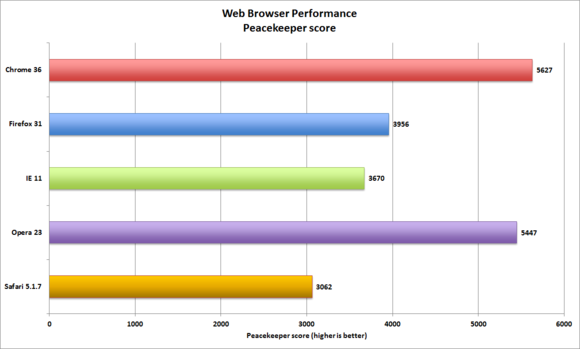
In our browser roundup, Chrome 36 posted the fastest time on Peacekeeper, while Safari was almost twice as slow.
If Javascript is a priority, Internet Explorer is easily the fastest running it. IE uses a lot of memory as well, if about half the processes of Chrome and Opera.
A big shout-out to Safari which used by far the least amount of memory to present the same nine tabs. If you’re working on a computer with only 512MB or 1GB of system memory, its spend-thrift ways might come in handy.
However, if I had to pick just one to keep on my system, it would be Firefox. It’s fast enough, it has the slickest interface, it uses considerably less memory than Chrome, IE, and Opera, and it’s just generally the easiest to use.
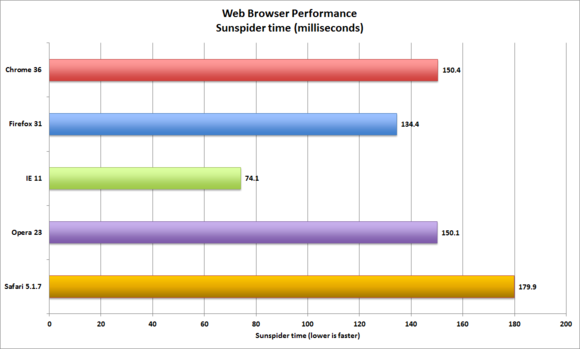
Internet Explorer emerged as the fastest browsers running the Sunspider Javascript test, with Safari limping in at more than twice as slow.
Performance and memory usage may be moot if your needs extend beyond the ordinary, in which case the browser you choose as your mainstay may come down to add-ons.
Fortunately, as all the browsers we tested are competent, free and export and import bookmarks, you can use any, or all of them. Yes, life is good in the browser world.
- Services & Software
Browser battles: IE vs. Firefox vs. Chrome vs. Opera vs. Safari
We run-down the latest versions of all the main browsers in a head-to-head comparison to sort out where each browser scores well or offers something unique that makes them a must-use proposition. Should you make a switch?

Jump to section
- Internet Explorer
A good browser does what you want, when you want it to. At a basic level, any browser you choose will do the basics — page display, secure websites for matters such as online commerce and banking — to a standardised level. So what marks out one browser from another?
We've taken a look at the latest and greatest from Microsoft, Apple, Opera, Google and Mozilla to sort out where each browser scores well or offers something unique that makes them a must-use proposition. Most users tend to use one browser and stick to it as a familiar kind of playground, but are they missing out on the best the web can offer as a result?
We're well past the point where you have to pay for a browser, and with the exception of Internet Explorer, everything we're looking at works across multiple computing platforms. These aren't benchmarks or reviews per se; we're just using the currently most up-to-date browsers to point out where it might be worth switching browsers.
The biggest players get to go first. So up first, we've got Internet Explorer 9.
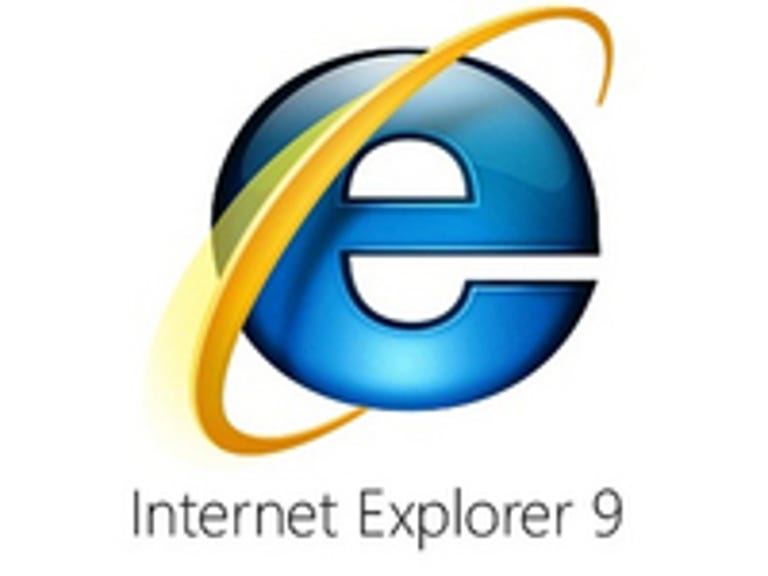
Internet Explorer 9 Beta
Where to get it: http://ie.microsoft.com/testdrive /
There was a time when Internet Explorer was the internet for most folks, with market share that was fast approaching 100 per cent. That time has passed, but IE still holds a commanding market share, and its status as default Windows browser makes it the standard choice for a lot of web users.
Still in beta at the time of writing, most of Internet Explorer 9 's big new features are under the hood and promise speed jumps over previous versions of Internet Explorer. To put it kindly, previous versions could often tend to be rather keen on using up as much memory as possible, but our sampling of IE9 suggests it's been slimmed down extensively. Likewise, the user interface finally drops the toolbar-heavy approach for a slimmed down interface that draws obvious comparisons with Google's Chrome. There's no shame in utilising a good idea, however, and that's what the slick Internet Explorer 9 interface does, right down to integrated search in the URL bar. Bing is not surprisingly the default, but you can easily add other search engines.
Speed is always a very relative thing to test, but in our use of Internet Explorer 9 , we couldn't call it sluggish the way one could so easily do with previous versions. HTML5 is natively supported, the underlying JavaScript engine has been rewritten, and there's support for hardware-accelerated text rendering, depending on the power of your underlying system. All of these things add up to a browser that, for Internet Explorer, is refreshingly fast and lean.
In terms of tweaked features, the two standouts are pinned tabs and the very nifty way that IE manages your add-ons. Pinned sites can be dragged down to the Windows Taskbar where they act like an individual program application instance. You can launch the sites of your choice automatically, and if the site developer enables it, right-click to launch site jump-lists. One-click site launching is very cool, and one of the first things we did with IE9 was add CNET.com.au to our Windows Taskbar. We'll wait while you do the same.
As for Add-On management, the very first time you start up IE9, it'll search out your add-ons and tell you how much time they add to the program start time, with the option to disable them individually or all at once. So if you enable an add-on and IE9 starts dragging its feet, it's easy to find the culprit and lop its head off in just a couple of clicks with no confusion.
And finally — and it's taken long enough, Microsoft — Internet Explorer has a download manager. Quite why we had to wait so long for such a basic feature will no doubt go down as one of history's great mysteries.
If you're still using Windows XP, however, there'll be no Internet Explorer 9 for you. The minimum requirements call for Vista SP2 or better. If you're stuck on XP for a specific reason, we'd suggest switching camps to Chrome or Firefox rather than sticking with an older and potentially less secure IE version, especially as its market penetration make it a favourite of hackers.
In terms of browsers, the current "Fords vs. Holdens" analogy would have to be Internet Explorer vs. Firefox. Over to all things Mozilla we head...
Firefox 4 Beta
Where to get it: www.mozilla.com/en-US/firefox/beta/
From looking at the beta version of Firefox 4 , it's clear that browser minimalism and top-loading tabs are the new black in browser design. Like IE9, Chrome and Safari, the newest version of Firefox eschews complicated toolbars in favour of a clean layout that emphasises the pages you're surfing to. On Windows (Vista and 7 only), the minimalist design means that all of Firefox's menus spring out from the inventively named (and arguably Opera-borrowed) "Firefox button" that sits at the top left of the user interface. Standard menu layouts can also be invoked with a tap of the Alt key. Our only complaint with the Firefox button is that it sits in a vertical plane by itself, taking up what feels like a lot of screen real estate. It's still early beta days, so hopefully that'll change for final release. Tabs have shifted by default from the bottom to the top, although you can tweak this back if you're not in favour of it.
If you're the type of web surfer who always has hundreds of tabs open, you'll appreciate Firefox 4's Switch To Tab feature. If you're entering in the URL bar ... sorry, "Awesome Bar" by official Firefox parlance, the details of something that matches an existing open tab, it'll offer you the option to switch straight to that tab. Not so useful for single tabs, but if you've got dozens shrunk down to the point where they can't be found, it's potentially quite handy.

On the technical side, Firefox 4 supports yet another new video standard, WebM. It's open source and seems reasonably slick, but whether it'll unseat Flash and H.264 in any significant way isn't yet clear.
Firefox 4 is still very much in beta, and with that in mind, there's a permanently affixed Feedback button on the top left of the browser screen. We'll give them extra points for naming the feedback options "FireFox Made Me Happy Because" and "Firefox Made Me Sad Because..." if only because it's a cute way to engage browser testers.
Firefox 4 is still a beta, and it showed intermittently in our testing, with a few crashes along the way. Other than that, however, it's a swift browser that performs well. Existing Firefox users should upgrade to it once it's gone final, and those wanting cross-platform compatibility and a good browser could well be tempted to switch camps.
Between them, Firefox and Internet Explorer eat up at least 80 per cent of the world's browser share. Moving over to Google next...
Google Chrome 8.0.552.224 Beta
Where to get it: www.google.com/landing/chrome/beta/
Is Google's Chrome ever not in beta? You can always play it safe and download the stable version, but for those who like to live a little on the wild side, Google's Chrome page has a permanent link to the latest beta version of the company's search-centric application. This makes picking the beta-specific updates rather tricky to actually spot, as so many features end up being organically adopted by the browser along the way. We tested with version 8.0.552.224, but there could well be a more fresh public beta by the time you read this. It gave us the choice on loading of importing existing settings and, to our surprise, choosing our preferred search engine. If ever there was a setting we'd figure Google would lock down by default, it's search.
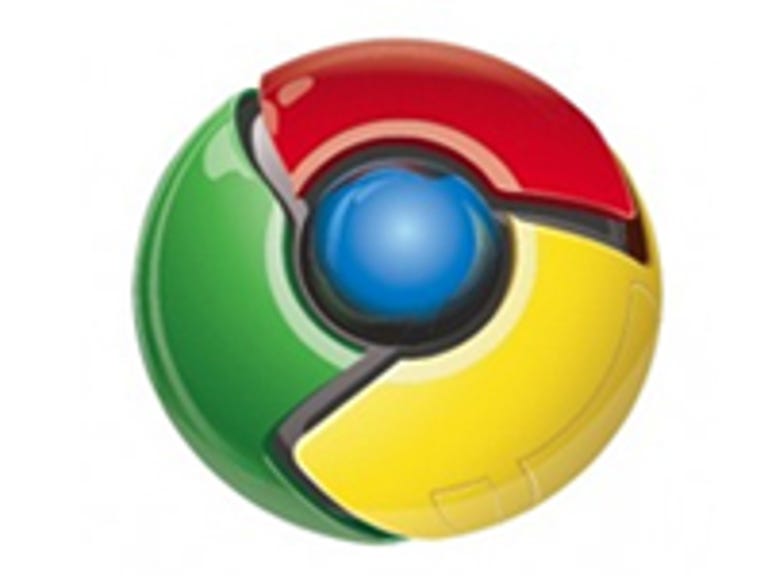
The big new feature (from a web surfer's perspective) in the Chrome 8.0.552 branch is Google's Chrome Web Store, a one-stop shop for various applications — everything from games to productivity applications is on offer, although at the time of writing, it's technically US only. This can be worked around with a credit card and a Google Checkout account, but developers keen on getting money out of Google should note that there's no way for Aussie developers to get paid — yet. Chrome Apps aren't really applications in the standard Windows sense; they're more like a mix of add-ons/extensions mixed with web pages, as nothing ends up as a distinct application on your desktop in the way you might expect.
As a browser, Chrome continues to be good at its core competency points. The stripped down look that every other browser is "borrowing" for its 2011 look was pioneered on Chrome, and it still arguably does it best, with a single bar for all searches and URL entry. PDF viewing is built in, and in version 8 it's sandboxed, so if you do end up with an errant PDF that would otherwise crash the whole browser session, everything else is protected.
The Chrome Web Store, in its current incarnation, probably isn't enough to get anyone to particularly switch camps if they're married to their current browser, but Chrome's swift page rendering, even in beta form, just might be.
From Google, we head into Operatic territory...
Where to get it: www.opera.com/browser/next/
Opera's main web page poses the question "What is faster than the fastest?", which, if nothing else, proves that the Norwegian firm doesn't really understand how comparative terms actually work. We do get what they're aiming at, though, which is to claim that Opera's browser is, perhaps, quicker than other browsers you might consider. The speed jokes continue with the latest beta, with the Spinal Tap-inspired tag line "This one goes to Eleven".
Opera has grimly kept hold of an idea that once permeated the browser space, namely that your browser could be multiple applications at once. It's the only browser in our round-up that comes with an integrated email client. It's neatly enough laid out, but the utility of this (especially in an age of web-based email clients that work across any browser) is debatable.

Opera's claim is that the browser code itself has been optimised to be 30 per cent smaller than Opera 10.60, making it a swifter install. It was fast to install in our tests, and while we weren't sitting with a stopwatch, we couldn't honestly say it was significantly faster than other browser installs. Once it's installed, it's there permanently anyway.
The big new feature for web surfers that Opera touts in Opera 11 is Tab Stacking. Clearly, we're all opening too many tabs at once, and Opera's solution to this crisis is to allow you to stack them into logical groups, which can then be previewed by hovering over a group, or fanned out across the tab bar. Creating groups is as simple as dragging one tab on top of another, although we did find it frustrating that you can't drag tabs sideways to group them. You've got to fully detach them from the tab bar and slot them back up onto another tab to create groups.
Mouse gestures have been made easier to access with a full visual GUI for quick page flipping, zooming, minimisation and duplication, depending on the gestures you wish to use. Mouse gestures are one of those features that you either love or loathe, but they're easily switched off if you don't like them.
Opera 11's browser bar also shrinks down longer URLs and more clearly displays the security information of a given site. Given the prevalence of phishing attacks, this is clearly a good thing.
And moving out of the beta space completely, we go on a Safari...
Apple Safari 5
Where to get it: www.apple.com/safari/download
Apple's notorious for not giving anything away until it's ready to say something, which makes reviewing Safari betas available to the general public rather difficult, although the company did reverse that position for a little while with Safari 4. As such, in the interests of testing something you can use too, we're stuck just looking at the regular stable release of Safari, which at the time of writing was version 5.03.
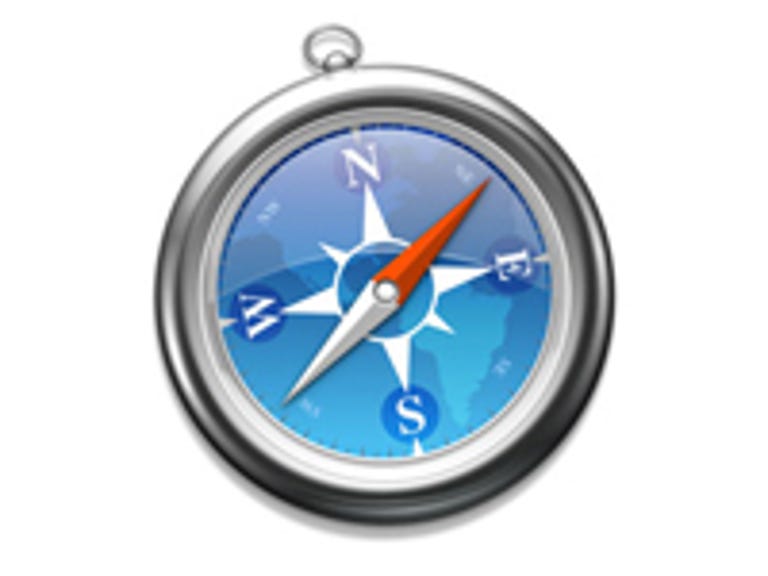
Safari doesn't boast a huge range of world-altering web browsing features, instead opting to run with that rather well-worn Apple credo of "it just works". And, indeed, Safari does just work, with a simple and slick interface that handles basic web tasks competently, if not in a manner that's all that exciting. The default "Top Sites" panel of commonly visited sites is a little more slick-looking than Google Chrome's very similar-looking "Most Visited" panel, but they both basically just do the same thing.
On a Mac, Safari takes the pride of place that Internet Explorer enjoys on Windows, and as such it's the default browser of many Mac users simply because it's "just there". On Windows, however, the reasons to switch to Safari, compared to other, more feature rich browsers, are less obvious. If you're a Mac user who intermittently dips into the PC world we could see the sense in a common user interface, but otherwise switchers would do better with something like Chrome or Firefox for an alternate browsing experience. It's not that Safari's bad at what it does, but in the free browser space, the alternatives simply do a little bit more.
Services and Software Guides
- Best iPhone VPN
- Best Free VPN
- Best Android VPN
- Best Mac VPN
- Best Mobile VPN
- Best VPN for Firestick
- Best VPN for Windows
- Fastest VPN
- Best Cheap VPN
- Best Password Manager
- Best Antivirus
- Best Identity Theft Protection
- Best LastPass Alternative
- Best Live TV Streaming Service
- Best Streaming Service
- Best Free TV Streaming Service
- Best Music Streaming Services
- Best Web Hosting
- Best Minecraft Server Hosting
- Best Website Builder
- Best Dating Sites
- Best Language Learning Apps
- Best Weather App
- Best Stargazing Apps
- Best Cloud Storage
- Best Resume Writing Services
- New Coverage on Operating Systems
- Full Stack Course
- React Native
- CSS Frameworks
- JS Frameworks
- Web Development
Opera vs Safari
Opera is a platform-independent web browser. It was developed by Opera software company. Its initial release was in 1995 and the latest version was released in 2022. It is based on chromium but it has certain advanced features. It is available in nearly 42 languages. This web browser was built using the C++ programming language. It supports various operating systems like Windows, Mac etc.
Safari is also a web browser used for surfing the internet and it was built by Apple. It was mainly used on the Mac operating system but it can also be used on Windows operating system. Initially, it was released in 2003, just like chrome it is also freeware. It is open source and is written using different programming languages like C++, Swift etc.

Following is a table of differences between Safari and Opera:
Please Login to comment...
Similar reads.
- Difference Between
- Web Technologies
- Web Technologies - Difference Between
- How to Get a Free SSL Certificate
- Best SSL Certificates Provider in India
- Elon Musk's xAI releases Grok-2 AI assistant
- What is OpenAI SearchGPT? How it works and How to Get it?
- Content Improvement League 2024: From Good To A Great Article
Improve your Coding Skills with Practice
What kind of Experience do you want to share?
You are using an outdated browser. Please upgrade your browser to improve your experience.
Compared: Safari vs. Chrome vs. Firefox vs. Edge on macOS in 2022

Safari vs. Chrome vs. Firefox vs. Edge on macOS, compared.
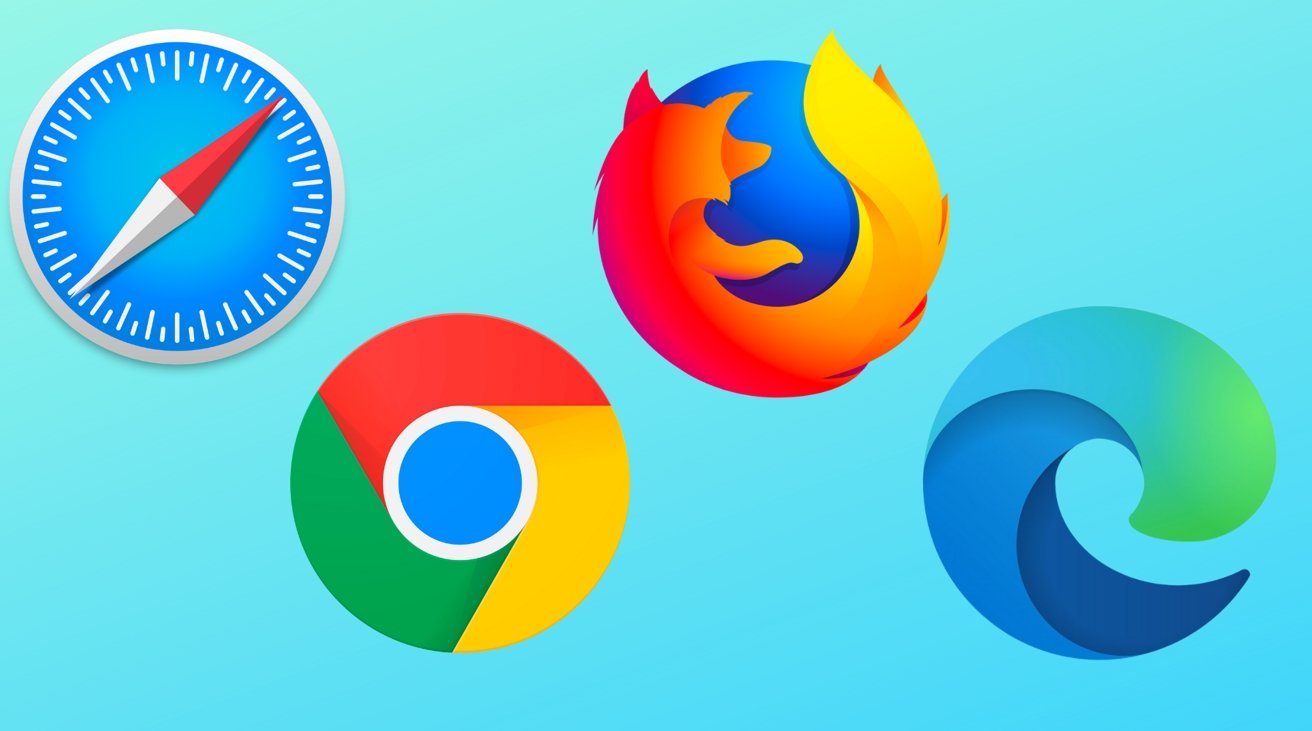
The truth is, the perfect browser doesn't exist. Each of the four most popular macOS browsers has its own set of strengths and weaknesses, just based on the engine that's used for web rendering, and what the developers of the big-four have prioritized.
While the best browser for the individual varies on use case, and which websites behave the best on any given browser, there are a series of benchmarking tools that can measure performance on synthetic tasks.
Browser benchmarks
We tested each browser on three different testing platforms: JetStream 2, Speedometer, and MotionMark.
JetStream 2 is a JavaScript-benchmark that scores browsers based on how quickly they can start and execute code, which translates to faster JavaScript performance. Since JavaScript is used on most web browsers, it's a good test of snappiness for code-intensive sites.
MotionMark is a graphical browser testing suite that measures the ability to render complex web pages. Think a page that has complicated graphics and animations. A higher score results in smoother transitions and animations.
Speedometer 2.0 determines the responsiveness of a browser when running web applications. Among the three, it's the truest option for testing real-world performance across many popular websites and online services. A good example is adding tasks to a to-do list in a web app.
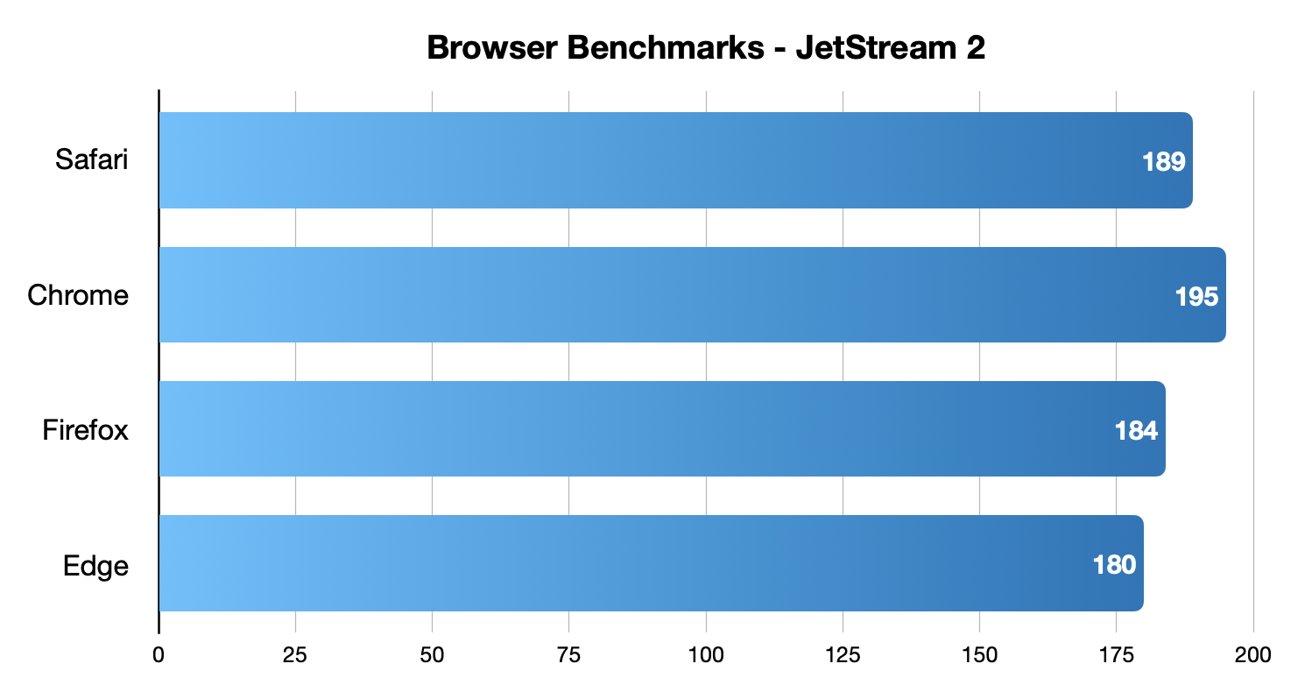
Chrome came out on top in JetStream 2 testing, while Safari took second place.
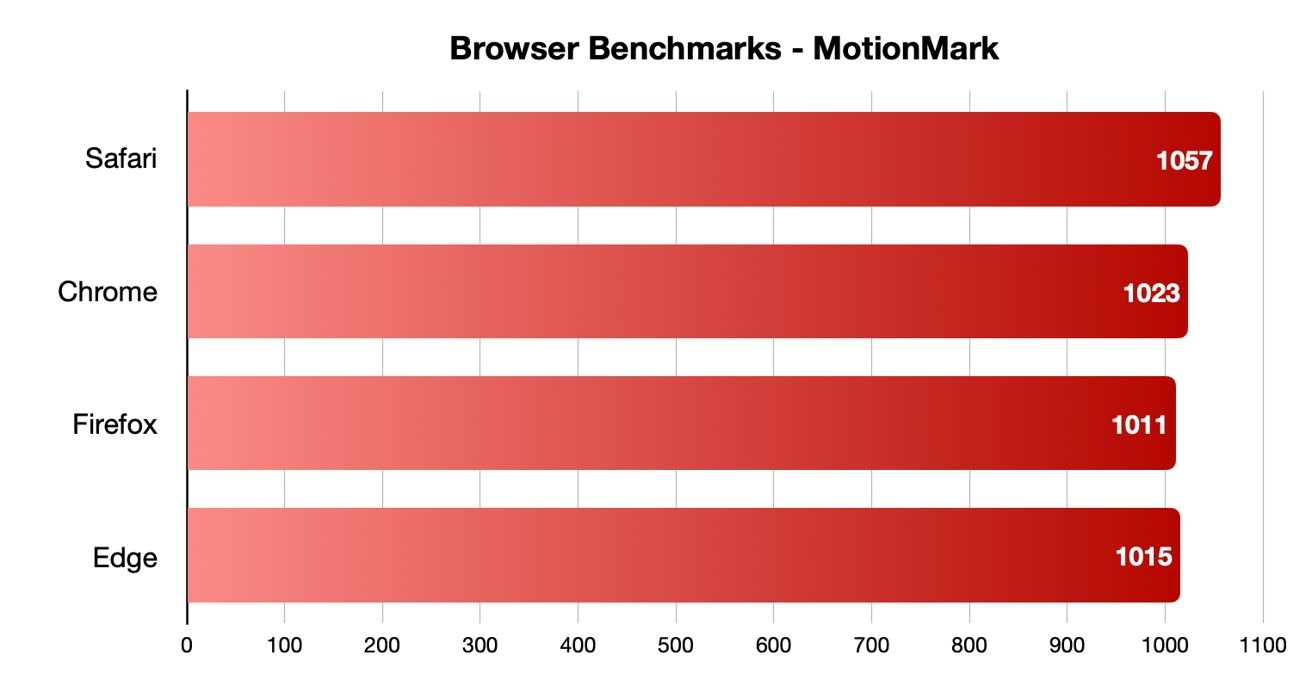
Safari was the fastest in MotionMark benchmark testing.
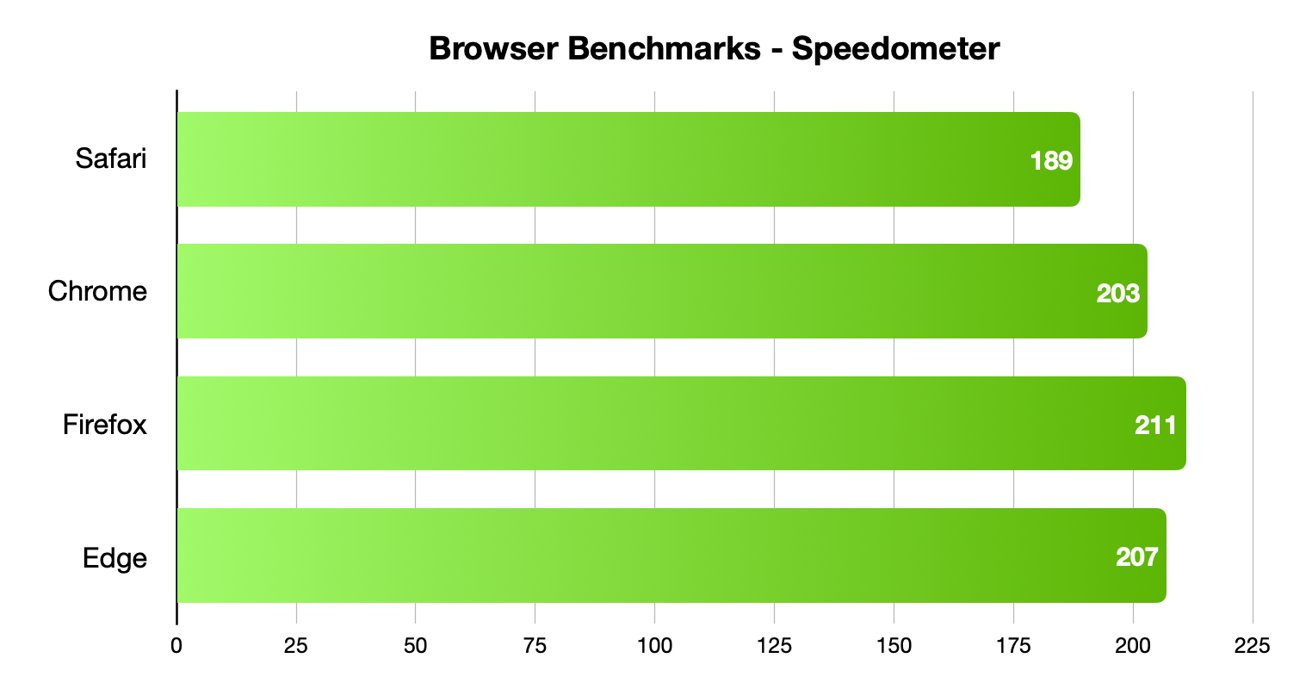
Speedometer testing showed off interesting results, with Firefox and Edge coming in first and second, and Safari in last place.
Different testing platforms result in different scores, so your own mileage may vary. Safari was the best for graphical performance, for example, but its responsiveness lagged behind others. Choose what specific metrics are most important to you.
For Mac users, Safari is an institution. It's the default browser on Apple platforms and is generally lightweight and efficient. As you'd expect for an Apple product, Safari also emphasizing privacy while you browser online.
From the very first boot on a new Mac, Safari is instantly available and configured for easy, private browsing. That makes it the best choice for the most non-technical among us, since you won't need to download and install anything. Safari "just works" out of the box.
It also features the tighest integration across Apple's other devices and systems. You can use Continuity to easy hand-off your browsing between your Mac and any iPhone or iPad you have around. If you need to buy something with Apple Pay , you can authenticate purchases with Face ID or Touch ID.
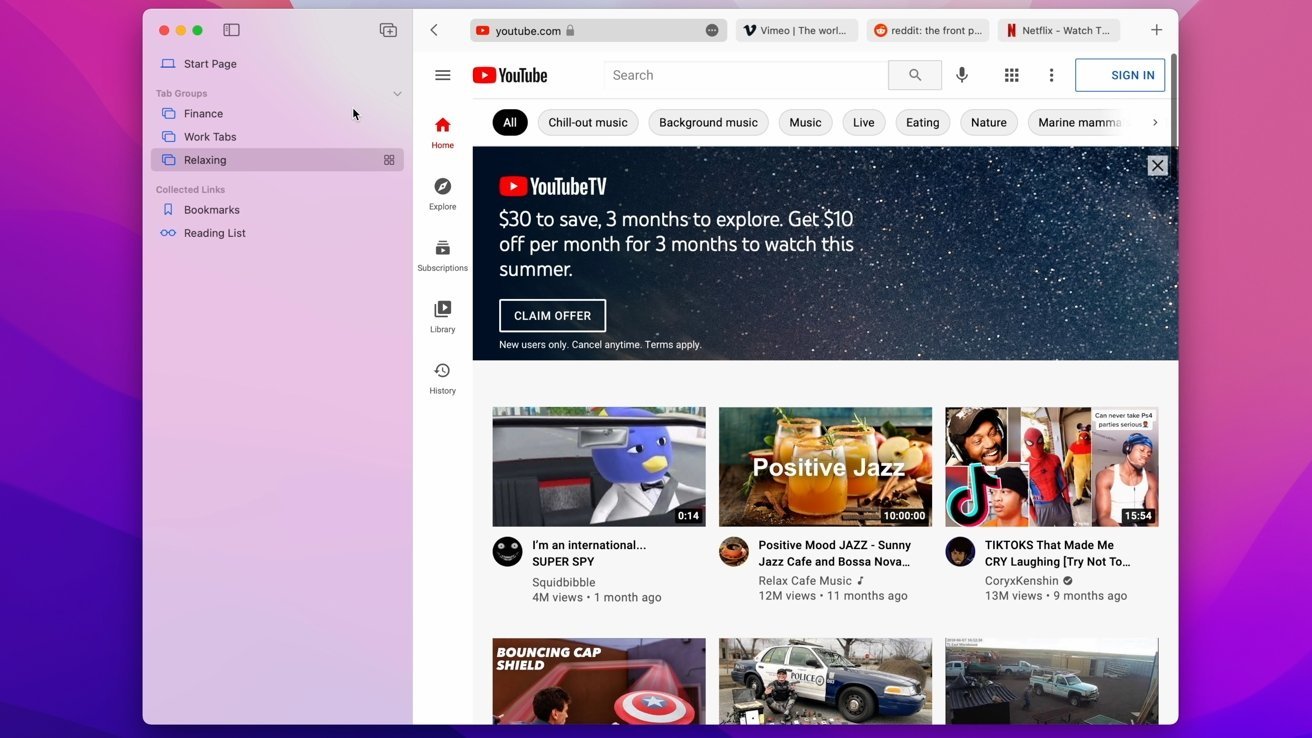
Safari also features some strong privacy protections, including mechanisms aimed at mitigating cross-site tracking and ad targeting. It features a built-in password manager that allows you to save and store passwords — with easy autofill options — across your Apple devices.
As an Apple-made product, Safari is the most convenient option on this list for Mac users — particularly those who own multiple Apple devices. It's also a good choice for the privacy conscious, though it isn't the fastest and it doesn't yet have a strong extension marketplace.
- Default Mac browser with effortless setup
- Strong privacy protections
- Integration with other Apple products
- Not the fastest or most responsive browser in some testing
- Lackluster support for add-ons and extensions
Google Chrome
Google Chrome is a massively popular browser, and a particular favorite of those who routinely use extensions to customize their web experience. It's the most-used web browser in the world, and it's faster and more RAM-efficient than it used to be. Chrome is even currently speedier than Safari on macOS.
The browser also has one of the world's most extensive list of add-ons, plug-ins, and extensions. From plugins focused on online privacy or to video content downloaders, there are around 190,000 extensions in total to choose from. You can also choose from a number of different themes and customization options.
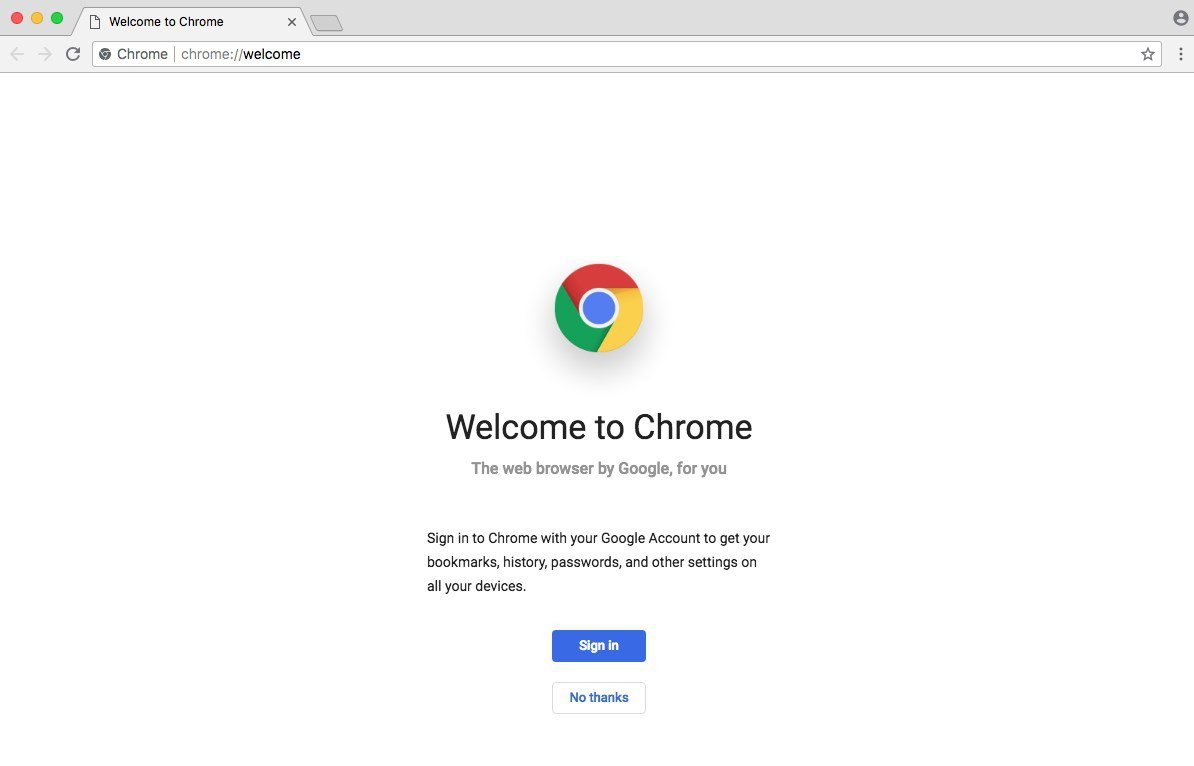
Intelligent Google-made features include automatic site translations and deep integration with the company's online tools and services — so it's great for those who rely on Gmail, Google Docs, or another Google service. Syncing between Google apps on different devices is also top-notch.
However, Google is a data company that relies on collecting information about its users. While the company has taken steps to bolster its privacy reputation, it's still a company that makes money on harvesting data. Those who are particularly privacy-conscious will probably want to look elsewhere.
It's hard to go wrong with the world's most popular web browser, particularly with its seamless workflow features and customization options. However, if you are even slightly concerned about online privacy, you may want to go with another option.
- Simple to learn, fastest option in some cases
- Syncs your Google account across other devices
- Extensive list of extensions and add-ons
- It's Google — so not that private
- Is a RAM and CPU hog
Mozilla Firefox is one of the only popular and mainstream browsers to have started life as an open source project. It's still a free and open source browser with a hefty focus on privacy and security, which could make it a good fit for those who want a Google Chrome alternative.
Because of its open source nature, users are free to explore Firefox's code — and they do. The browser doesn't have any hidden secrets or data-harvesters. It also features some excellent built-in privacy and security protections, including Enhanced Tracking Protection and an extensive list of customizable permissions.
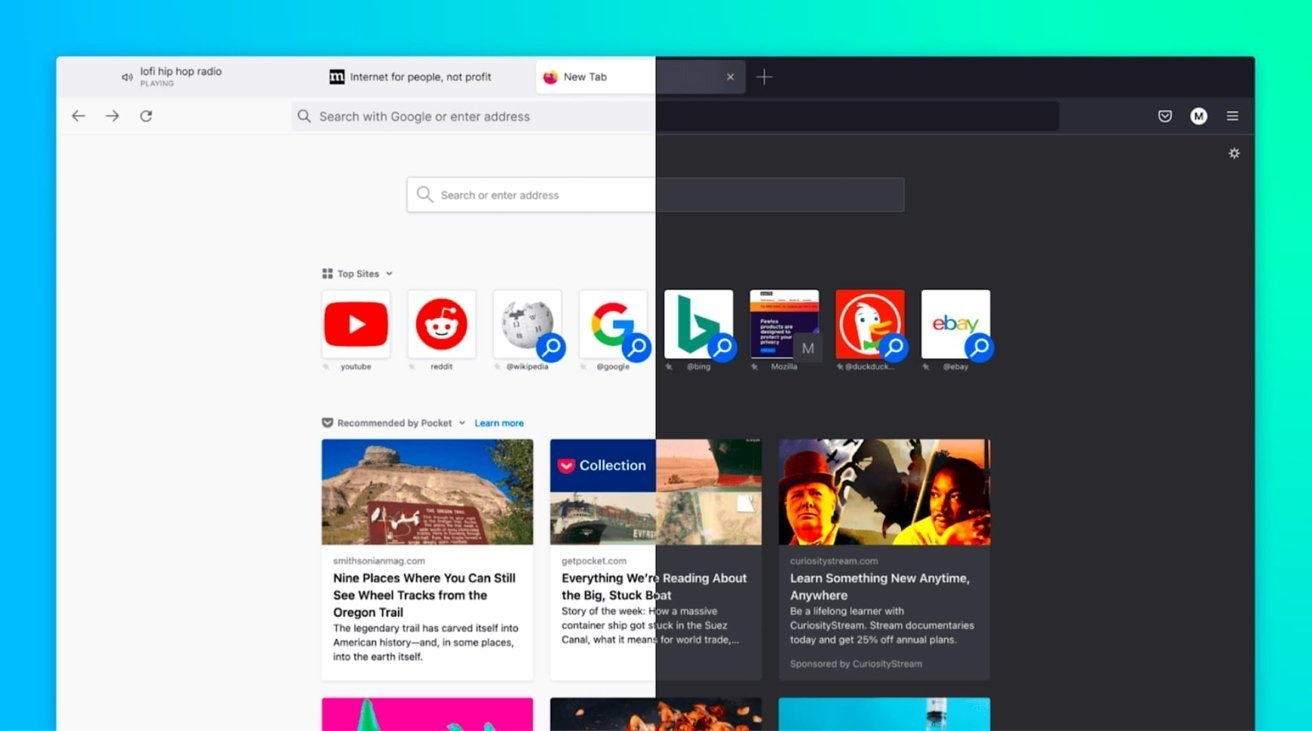
Firefox was also the first browser to actually offer third-party extensions and add-ons. Although it might not have as many extensions as Google Chrome, you'll still find a hefty list of options ranging from privacy add-ons to customizable themes for your browser.
Although Firefox has some cross-platform integration between its app and built-in Pocket support, it isn't as seamless as Chrome or Safari. If speed if your primary concern, it's also important to note that Firefox isn't the fastest browser by most metrics.
Users who want an open source browser or are committed to Mozilla's mission of keeping the internet open and free will find a browser after their own hearts here. For the average user, however, another browser on this list might be a better fit.
- Completely free and open source
- Extremely customizable with extensions, themes, etc.
- The best option for hardcore privacy
- Not the fastest or most RAM efficient
- Synchronicity isn't as robust
Microsoft Edge is the spiritual successor to Internet Explorer that was first released in 2015. Originally HTML-based, Microsoft overhauled the browser to be based on Chromium, which is the same underlying software used to make Google Chrome.
As such, Microsoft Edge is now much more competitive than it used to be. It's far from a Google Chrome clone, but you should expect a similar level of performance from it. Some users believe that Microsoft Edge even feels snappier than Chrome on a Mac.
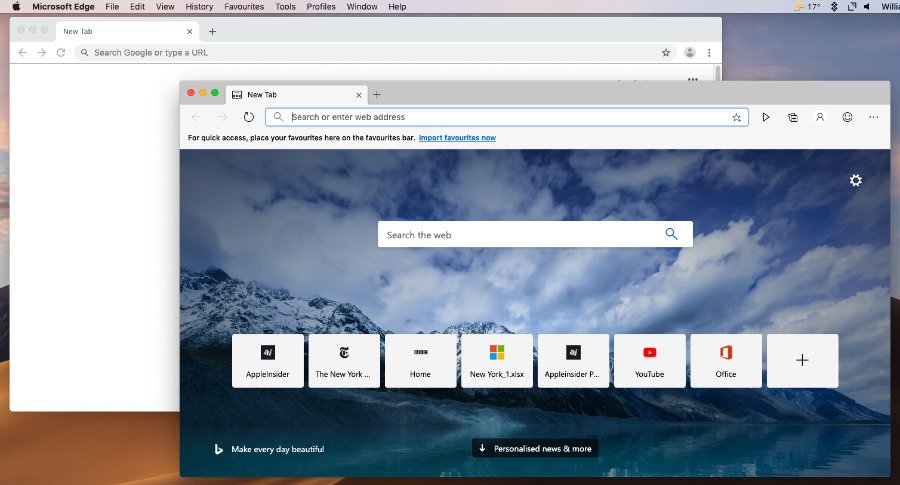
Because it's Chromium-based, Microsoft Edge also has a list of extensions similar to Chrome. It also sports a number of unique features, such as a "Collections" ability that lets you save information like text or webpages to a built-in notebook. There's also a vertical tab bar, a built-in read aloud feature, and an easy native screenshot tool.
It's a solid option for anyone that doesn't like Safari and wants an alternative to Google Chrome because of privacy reasons. If you use a Microsoft account like some use a Google account, then Edge might also be a solid option.
- Snappy, lower RAM and CPU usage
- Unique features like Read Aloud and Collections
- Good performance in most metrics
- Can be slower than Chrome in terms of pure performance
- Syncing isn't as strong as Safari or Chrome
The perfect browser doesn't exist, but you can pick and choose what you need
There's no clear answer for what the "best" browser on macOS is. However, some browsers are better suited to specific tasks than others.
When it comes to smooth JavaScript execution, Chrome is in the top spot with Safari a close second. Safari, according to the MotionMark testing, handles complex web pages better than any other browser.
Firefox, interestingly enough, may be the fastest when it comes to general everyday web apps.
Of course, there's also the issues of extension support, privacy, and synchronization across other devices. Many of the browsers are evenly matched on these metrics, but some excel in specific areas like privacy or cross-platform integration.
But, unlike on iOS, you aren't effectively stuck with one browser core technology. These four browsers, and several more, are available on macOS, and can be run in parallel.
While we don't recommend running all four unless you're a web developer or unit case tester, two or three different browsers can be run at-will, if any given browser doesn't handle your work case well.
Top Stories
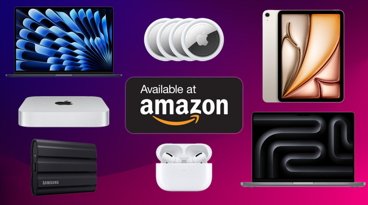
Amazon launches Labor Day sale on Apple, save up to $500

What to expect from Apple's September 9 iPhone 16 'Glowtime' event
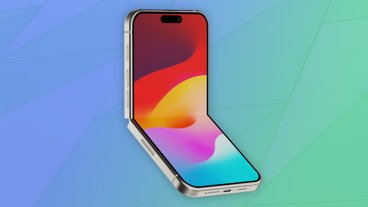
Apple's future iPhone Flip - all the rumors about a possible foldable iPhone

New M4 Mac models being tested ahead of likely October release

Apple CFO shakeup: Kevan Parekh replacing Luca Maestri

Exclusive: every iPhone 16 & iPhone 16 Pro camera spec & Capture Button detail revealed
Featured deals.

Labor Day deals hit Sonos speakers & headphones, offering up to $280 off
Latest news.

Satechi 4-in-1 USB-C Hub review: Data transfer galore
The Satechi 4-in-1 USB-C Hub is a portable yet reliable hub for optimizing data transfers to and from your laptop.

Low iPad mini stock could hint at impending upgrade with Apple Intelligence
Internal Apple sources suggest iPad mini is "constrained," which hints that the aging device could finally see a refresh in the fall — perhaps with Apple Intelligence support.

Luca Maestri has served as Apple's CFO for over a decade, but he's stepping down and being replaced by Kevan Parekh, Apple's current VP of Financial Planning and Analysis.
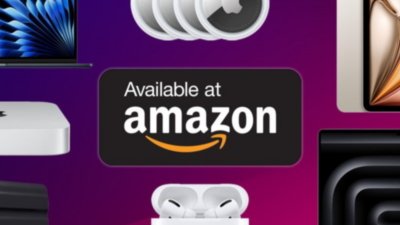
Amazon's Labor Day sale is live and Apple products are heavily discounted. Save up to $500 on AirPods, iPads, Macs and more.

Musicians to lose Finale notation app after 35 years
Mac and Windows notation app Finale has been used by musicians since Macs had nine-inch black and white screens, but now its developer is shutting it down and directing users to alternatives.

Apple has confirmed its "Glowtime" special event will take place on September 9. Here's what to expect to see from the event alongside the iPhone 16.

Nest Smart Learning Thermostat, Sonos app issues, & Wi-Fi issues on HomeKit Insider
On this episode of the HomeKit Insider Podcast, we review the brand-new Nest Learning Thermostat fourth-generation as well as answer a few listener questions.

Apple taps LG Innotek for all iPhone 16 Pro and iPhone 16 Pro Max tetraprism lenses
The main manufacturer of tetraprism lenses for the iPhone 15 Pro Max is now said to initially be the sole supplier of it for the iPhone 16 Pro and iPhone 16 Pro Max.

Recently discovered developer test logs suggest that Apple is preparing to release a new M4 Mac a month after the iPhone 16 event.

Apple-1 owned by Apple's first applications engineer sells for over $300,000
An Apple-1 computer owned by Apple's first applications engineer, Dana Redington, has commanded quite the price on the auction block, along with a panoply of other Apple-related items.
Latest Videos

Hands on: All the changes in iOS 18.1 beta 2 & iOS 18 beta 6

Retro gold rush: which emulators are on the App Store, and what's coming
Latest reviews.

Rode Wireless Pro review: Impressive features, superb audio quality

Backbone One 2nd gen review: sleek upgrades to a classic iPhone controller

{{ title }}
{{ summary }}
- Technology Jobs
- Reports and Whitepapers
- News for CIOs
- Digital Security Zone
- Webinar Highlight Reports
- Roundtable Highlight Reports
- 2023 IT Salary Calculator
- AI Directory
- Featured Partner Content Hubs
- Digital Magazines
- Senior Contributors
- Technicity GTA
- CIO OF THE YEAR
- CDN Channel Innovation Awards
- Digital Transformation Conference and Awards
- Canada’s Top Women in Cybersecurity
- CDN Top Women in the Channel
- Analytics Unleashed
- All IT World Canada Events
- President to President
- All Tech Videos
- Cyber Security Today
- Hashtag Trending
- Leadership in the Digital Enterprise
- All Hands on Tech Video Podcast Series
- Deeper Dive
- ITWC Podcast Network
- Contributor Opportunities
- Gartner Corner
- Privacy Policy
- CIO of The Year
- Emerging Tech
POPULAR CATEGORIES
- Emerging Tech 24490
- Security 8749
- Infrastructure 8593
- Government & Public Sector 6289
Content Types
Videos Podcasts Blogs Slideshows
ALL CATEGORIES
The best browser: chrome, firefox, ie, opera, or safari.
Not too long ago the job of a Web browser was simple: Get the text from the Internet and pour it into the window. If a tag like comes along, change the font. Now the challenges are greater because the browser is becoming the home for almost everything we do. Do you have documents to edit? There’s a Web site for that. Did you miss a television show? There’s a Web site for that. Do you want to announce your engagement? There’s a Web site for that too. The Web browser handles all of that and more.
Choosing a best browser is an impossible job. On one hand, the programs are as close to commodities as there are in the computer industry. The core standards are pretty solid and the job of rendering the document is well understood. Most differences can be smoothed over when the Web designers use cross-platform libraries like jQuery. Many Web sites look the same in all of the major browsers, a testament to the hard work of the developers and their desire to get their information out to the largest audience. On the other hand, there’s a lot of competition, and some very smart people are working hard to produce very clever new innovations. Yes, some of the so-called innovations are trivial, but if you’re going so spend all day with a piece of software, it makes sense to be picky. While you may not care if someone moves a button from the left to the right, other users do — and the discussion forums are filled with debate.
It may be impossible to be rational about many of the cosmetic issues, like the placement of buttons or the location of the tabs. These are intensely personal decisions, and the look and feel can often be changed with add-ons. There’s not much point debating these issues.
The technical details can also be a bit personal and political, but they have bigger implications for developers and consumers everywhere. You may or may not like Adobe Flash , but the support or lack of support is important for all of us. Careers of Flash developers and the fate of projects they build will rise and fall on these issues. And Flash is just the beginning — all of the browsers are rolling out various combinations of new features, but developers can’t begin to use them until there’s a stable platform with wide enough adoption. The control of the living room screen is worth billions of dollars, and the success or failure of the browser’s video delivery mechanism will determine who may or may not have control over that shimmering rectangle and the zombie eyes glued to it.
Choosing a Web browser is made even harder because solid numbers are often preludes to debate. Some people complain when their browsers suck up every spare byte of memory. Others want their browsers to respond immediately. In many cases there’s a trade-off because the programmers gain speed by filling up the memory and precomputing and precompiling every part of the Web page. You can have small or you can have fast, but you can’t have both.
Often, the bloat isn’t the fault of the browsers themselves, but the Web designers who lard up the site with endless AJAX calls and slick morphing features. Some users may blame the browser when they have 80-odd tabs opened to pages that are issuing AJAX calls left and right. The poor browser has to try to keep them all ready in case someone wants to see any of those tabs immediately.
Choosing among Chrome , Firefox , Internet Explorer , Opera , and Safari is not simple. All are perfectly good choices, but one may be slightly better for certain users than others. Sophisticated users, including developers, may want a browser that supports the latest standards, while casual users may want to avoid the cutting edge for simplicity and stability. Others may have a favorite plug-in they can’t live without. Some users may want to choose based on the location of the buttons. The choices are close enough that this could be fair if you really care about your interface.
The battle of the Web browsers: Google Chrome 5.0 It’s easy for a programmer to be enthusiastic about Google’s Chrome because Google has been emphasizing some of the things that programmers love. Chrome sticks each Web page in a completely separate process, which you can see by opening up Windows Task Manager. If some Web programmer creates an infinite loop or a bad AJAX call in a Web page, Chrome isolates the trouble. Your other pages can keep on running. This isolation isn’t perfect, though, because Chrome users have still experienced crashes .
The good news is that Chrome is among the fastest current browsers, at least when using long-running JavaScript loops as benchmarks. It also offers good support of the HTML5 standards and will continue to push them, at least in spirit.
There is some confusion afoot, though, because in addition to backing HTML5, Google is also embracing Adobe Flash . Google is supporting Flash by including it in the Android OS, and reports claim future versions of Chrome will sport their own, well-tuned version of the Flash plug-in , an approach that will probably do even more to fix crashes and annoying bugs. The developers won’t be able to point at each other across the moat and blame the other side.
Google also encourages plug-ins, and the collection for Chrome is growing quickly. Chrome’s plug-in architecture is much simpler than Firefox’s because it only lets coders write in HTML, CSS, and JavaScript. This is typically more than adequate, and many Firefox developers port their creations to Chrome with little extra work.
If there’s one complaint about Chrome, it’s that it remains a relatively small presence; thus, Web developers usually get around to testing their work on Chrome only after trying IE, Firefox, and Safari first. Just the other day, one of Facebook’s AJAX calls failed on Chrome but worked when I tried the same button on IE. Chrome offers nice developer tools, though, and I suspect that the Web development gap will slowly disappear.
If that’s not enough for you, Chrome is also the one and only component of the Chromium OS . When the operating system boots, it starts up Chrome, then it’s nothing but HTML for your machine. It’s a very lightweight vision of the future.
Best for: People who want to juggle many windows filled with code that crashes every so often. Worst for: People who get upset when a website breaks because the developer tested the site on IE only.
The battle of the Web browsers: Firefox 4.0 beta The old Netscape died years ago, but somehow it begat the Firefox browser that gave us many of the innovations being copied by IE and others. The project found a nice source of revenue by routing search requests to Google, and this supported much of the work of the last few years.
No one knows how stable this source of revenue will be in the future. Google leapfrogged Firefox by building a browser of its own , in part to fix the headaches caused by malfunctioning plug-ins like Flash. Firefox is now offering its own “crash protection,” which restarts plug-ins when they stop delivering. Firefox handles this internally, though, because the browser still runs most of the work in one process. Chrome relies more on the operating system by sticking each page in different OS processes, an approach that the Mozilla group will probably eventually come around to using.
One of the strengths of Firefox continues to be the large collection of extensions and plug-ins. These can all be written in a mixture of JavaScript, CSS, and HTML, something that makes them a bit easier for the average Web developer to tackle. (In contrast, Microsoft’s add-ons can be written in C++.)
Firefox add-ons like Greasemonkey make it even easier to write simple scripts that meddle with the DOM of incoming data, a nice playpen for creating your own quick add-ons. Firefox’s model is pretty sophisticated too. While many widgets and extensions in the world are limited to JavaScript, CSS, and HTML, Firefox offers serious programmers more control with XUL. Is it necessary? I’m not sure, but it certainly makes it possible to create more sophisticated applications.
Firefox has not offered the fastest JavaScript performance on the computation-heavy JavaScript benchmarks, but that may not be important for most users. The speed of rendering and the responsiveness of the Internet connection are probably much more important to average browsing. Nevertheless, the Mozilla developers say a new JavaScript engine will be arriving in the fall.
Best for: People who enjoy the wide-open collection of extensions. Worst for: People who write long-running scientific simulations in JavaScript.
The battle of the Web browsers: Microsoft Internet Explorer 9.0 beta The days when practically everyone used Internet Explorer are long gone, but the browser continues to dominate, thanks to the fact that it may or may not be integrated with the Windows operating system, depending upon the political winds. Microsoft noticed the erosion from total world domination several years ago and is now rapidly adopting some of the best features from the alternatives. Tabs were added some time ago, and Internet Explorer add-ons are now plentiful enough to form a gallery. Many of the innovations that began with Firefox and Opera are now available with IE8.
Some of Microsoft’s claims may strike you as a bit funny. The company notes on a checklist that IE8 supports “Web standards,” then points out it supports only CSS 2.1 because it’s more common than the newer CSS 3.0. Well, yes, and CSS 2.1 will remain more customary until IE officially adopts it because most Web developers will want to avoid heavy use of any feature that doesn’t work on one of the most ubiquitous browsers.
But if Microsoft isn’t on the cutting edge of the new standards collectively called HTML5 , it’s pushing its own features. IE8 helps people “browse safely,” a worthy goal that it pursues by offering more and better ways to check the provenance of the information. I’m not sure whether it’s possible to actually attach a number to this protection — Microsoft claims that IE is “5 times better than Chrome” and “2.9 times better than Firefox in protecting against malicious malware.” The company claims IE can do a better job of catching fake URLs and URLs that lead to sites pretending to be something they’re not. Whether or not this can be quantified, it’s a promising path to take because the provenance of information is a big, big challenge for the Internet.
This focus, however, is coming after a long series of security holes in either IE or the add-ons given too much power by IE. Any search engine can help you find stories about hundreds of vulnerabilities found and patched. The root of all of these troubles seems to come when IE is a bit too generous to plug-in packages. This is almost certainly a deep failure of a strategy to let developers add many features that work very well with Windows and not other systems. ActiveX controls, for instance, offer nice performance through deep integration with the operating system, so they help cement IE and Windows’ position. The only problem is that this deep integration has produced many, many vulnerabilities over the years, and it’s not clear that Microsoft has finally stopped them all.
I’m personally torn about the approach Microsoft has taken. While this deep integration has opened up many opportunities, it has also created problems beyond the security dangers. Add-on developers have access to the registry and other weird corners of the operating system, a big difference from the simpler sandboxes used by the other browsers. I’m sure some Web-based game developers appreciate this speed, but I think a simpler model would have been easier on everyone.
IE9 now offers many of the features that drew me to other browsers. There’s a nicer developer tool for debugging JavaScript, and the speed is catching up to the others. The collection of IE add-ons is large and markedly different in style from those for other browsers. Many come from merchants who offer to help make it easier to search their catalogs, spy good deals, and of course spend money. There are so many toolbars that it’s easy to build a browser with a fat header and a tiny spot for real content.
In the end, IE’s greatest strength may continue to be its fading dominance. Web developers may skip testing on Safari or Opera, but they know that the boss or the boss’s boss is probably using the default browser shipped with the computer. Despite the prevalence of good cross-platform libraries, I continue to find Web pages that only work on IE. This is the kind of feedback loop that reinforces dominance.
Best for: People who don’t care or don’t want to care. IE is still the most likely to work with most websites. Worst for: People who worry about browser-based attacks and those who want to try the latest HTML5.
The battle of the Web browsers: Opera 10.60 For a long time, Opera’s main selling point was raw speed. The company was proud of how its browser rendered a page faster than any other. This domination continues. Opera version 10.60 on Windows got the fastest results in the SunSpider JavaScript benchmarks of any of the browsers I tested. All of the browser developers are reporting big gains in SunSpider and similar benchmarks, but Opera still seems to be leading.
I’m not sure if this is a critical point for users because the main bottleneck seems to be the speed of the Internet itself. However, JavaScript execution speed may become more important when people start using their browsers to do large amounts of data manipulation and raw computation. The SunSpider benchmark includes many computationally complex operations, like AES encryption and searching for prime numbers with a sieve. Still, much of the work handled by JavaScript today is rendering some XML data or changing some background color.
Opera the company, though, is not focused strictly on the browser. It continues to offer smart, out-of-the-box software that rethinks the current model. Opera Turbo, for instance, is a layer of proxy servers on fast Internet lines. Opera Turbo will fetch the pages for you, then compress them to save bandwidth. This may not be a big win for people with fast lines to their desk, but it should be valuable to mobile browsers with slower network connections and — this is important — tight limits on the amount of data that can be consumed each month.
Another neat solution is Opera’s widgets, little Web applications that run on your Windows, Mac, or Linux desktop. I’m not sure I would go so far as to call them “native applications,” as some documentation does, because the widgets are written in Web languages (HTML, CSS, JavaScript) and run in some Opera sandbox. But somewhere in the stack there’s some x86 code, right? These are structurally pretty similar to the widgets that are part of Mac OS X. Opera also has a few tools that make it relatively easy for anyone with a hint of programming ability to create a widget.
Indeed, it’s almost unfair to focus too much on the desktop version of Opera browser because the company is tightly connected with the mobile market. It continues to innovate and surprise me more than any of the other teams.
Best for: Raw speed and innovation. Worst for: People who can’t imagine straying from the pack.
The battle of the Web browsers: Apple Safari 5.0 Apple took the old Konqueror browser from the Linux world and injected a large amount of development talent to produce a very nice browser for Mac and Windows. Safari’s WebKit engine is also the heart of the browsers in the iPhone and the iPad.
Safari is a very good option. The speed is competitive, the controls are simple yet comprehensive, and the developer tools are nice. Apple is just opening up an extensions gallery to the general public, and some developers have already ported popular extensions from Chrome and Firefox . There’s nothing missing from Safari that a user might want, but on the other hand there’s little to make Safari unique or irresistible.
The biggest interest in Safari on the desktop may come from the Web developers who want to target the iOS world of the iPhone and iPad. Creating customized Web pages is simple to do with a few extra tags, and the result often runs like a native app developed for the platform. Plus, Safari isn’t the only browser built on WebKit. Google also uses the WebKit rendering engine for its Android phones, and the iOS and Android browsers behave similarly in many but not all cases. When RIM’s BlackBerry team releases its own WebKit browser, WebKit’s dominance of the mobile Web will be even greater.
Apple is pushing HTML5 as part of its skirmish with Adobe over Flash . Safari already offers many of the most important HTML5 features, and it will almost certainly get more of them quickly.
Best for: Web developers who want to support WebKit phones. Worst for: Lovers of extensions and add-ons.
Would you recommend this article?
Featured download.
Featured Articles
Cybersecurity in 2024: priorities and challenges for canadian organizations , survey shows generative ai is a top priority for canadian corporate leaders., related tech news, ey canada, microsoft launch climate stress testing initiative for fis, lock down teamviewer or pay a price, many it departments still don’t know how many apis they have: report, subscribe to our newsletter.
Our experienced team of journalists and bloggers bring you engaging in-depth interviews, videos and content targeted to IT professionals and line-of-business executives.
Tech Companies Hiring Right Now
Popular stories this week, itwc network.
- IT Business
- Channel Daily News
- Direction Informatique
- ITWC Events
- ITWC Podcasts
IT World Canada. All Rights Reserved.

COMMENTS
Chrome maintains its longtime lead on this test with a score of 528. Edge, Opera, and other Chromium-based browsers hew closely to Chrome. Firefox and Safari bring up the rear, at 515 and 468 ...
Opera vs Safari. Opera Browser is considerably more private and customizable than Safari, and offers a wider range of productivity features that can be used on any device. Review the key differences between Safari and Opera Browser below, and download the browser that is best for you. See more.
Security is also a big part of Apple's ecosystem, and Safari follows Apple's security standards rigorously. Although Safari works great with other Apple products, it's not that customizable, but despite that, it's still a great web browser and a great choice for Apple's users. ⇒ Get Safari. Opera: A complete package.
Google Chrome leads the web browser market with a 64.68% share, according to Statcounter. Apple Safari follows with 18.29%, Edge at 4.23%, Mozilla Firefox at 3.01%%, and Opera at 2.25%. Internet ...
Ad. When comparing Opera vs Safari, the Slant community recommends Safari for most people. In the question "What are the best desktop web browsers?". Safari is ranked 18th while Opera is ranked 28th. The most important reason people chose Safari is: The rendering of the pages and the browser compatibility with OSX works smoothly, when ...
3.0 Good. The default Mac and iOS browser is a strong choice, though its interface has some nonstandard elements. Safari was a forerunner in several areas of browser features. For example, it was ...
By the end of this comparison, you will have a better understanding of which browser suits your needs the best. Introduction to Safari and Opera. Web browsers have become an integral part of our lives, allowing us to access the vast expanse of the internet with ease. Two popular web browsers that have been around for a while are Safari and Opera.
Pros. The browsing experience is very user friendly and it has a nice, clean looking interface. If you are an owner of multiple Apple devices, Safari will track your open tabs across all of your devices. It is a very good and fast browser if you own an Apple device. Its minimalism and lightness make it a very good choice.
Support for Dolby Digital and screenshots. Opera and other Chromium-based browsers hew closely to Chrome, while Firefox gets 491, and Safari 471. Just a few years ago, a score in the 300s was ...
Summary: Opera Browser provides better privacy and security than Google Chrome, without using up your CPU & RAM. And with more advanced productivity features, Opera is more intuitive and efficient compared to Chrome. ... Compare web browsers Opera and Safari . Summary: Opera Browser provides superior privacy over Safari, with free features that ...
Speed and Performance: Opera is known for its speed and performance, providing a fast and efficient browsing experience. Safari, on the other hand, is optimized for Apple devices and offers superior performance and speed, especially on Mac computers. Compatibility: Opera is compatible with a wide range of operating systems, including Windows ...
Chrome currently leads with a score of 528. Opera and other Chromium-based browsers hew closely to this, while Edge gets 492, Firefox 491, and Safari 471. Just a few years ago, a score in the 300s ...
90 % - Excellent. Safari's performance is, for the most part, superb on both Mac and iOS. We tested Safari's speed, compared to Chrome on Mac, to see how it performed. We used BrowserBench ...
Comparing Opera GX and Safari. When it comes to choosing a browser, there are several factors to consider. Let's dive deeper into the comparison between Opera GX and Safari to help you decide which browser is better suited to your needs. Performance and Speed. When it comes to performance and speed, both Opera GX and Safari are highly optimized ...
It uses fewer resources than Chrome or Opera, spawning only a single process, and using only 510MB of memory. Only the super-thrifty Safari used less memory. Keep reading for details on Internet ...
Opera 11's browser bar also shrinks down longer URLs and more clearly displays the security information of a given site. Given the prevalence of phishing attacks, this is clearly a good thing.
4. The performance of opera is comparatively lower than safari. It provides the best in class performance and is known for its browsing experience. 5. It focuses more on normal people than developers. Developers consider it the best web browser according to their needs. 6. It provides a built-in speed dial feature.
Safari, according to the MotionMark testing, handles complex web pages better than any other browser. Firefox, interestingly enough, may be the fastest when it comes to general everyday web apps.
When talking about Opera GX vs Safari, we must mention that, even though they cater to distinct audiences, they overlap in some aspects. Both focus to increase speed and efficiency. But Opera GX markets itself as the world's first gaming browser and is cross-platform, while Safari prioritizes integration with the Apple ecosystem.
Choosing among Chrome, Firefox, Internet Explorer, Opera, and Safari is not simple. All are perfectly good choices, but one may be slightly better for certain users than others.
i haven't used safari or opera gx, but i heard stuff about them, if you want privacy then safari is better than opera gx, but if you don't want privacy then you would probably like opera gx more, i use librewolf (firefox but hardened) because i want my browser to be really good for privacy, in my opinion firefox is better in almost everything than safari, atleast from the info i have gathered ...
Safari was the fastest and better performing browser for nearly a decade. Now it sucks. No idea what they've done to it, but it's nearly unusable for me - tabs crashing, reloading, slow, etc. I despise chrome. Never used Opera or vivaldi on a mac. Using Brave right now, and am pretty happy with it. Solid performance, stable, and it pays me to ...